
Rising demand
With single-family homes increasingly out of reach, many buyers are turning to manufactured homes, Page 2
PROVIDED BY COREY J. BISHOP


Rising demand
With single-family homes increasingly out of reach, many buyers are turning to manufactured homes, Page 2
PROVIDED BY COREY J. BISHOP
2025 I VOL. 4, NO. 2

While the cost of traditional housing has priced many buyers out of the market, these homes are







For every manufactured home it builds, Titan Homes completes a three-step quality review by sta members, a third-party inspection agency and an independent inspector that reports straight to the general manager. “Between those three elements that keeps quality at a very high standard,” said Jim Davis, Titan’s general manager.
BY C LAIRE O’CALLAHAN
In the Berkshires, renters and prospective homeowners are on the hunt for housing that doesn’t consume more than half their monthly paycheck.
The search is directing many to a nondescript housing option at the far end of the market: Mobile homes.
But even as demand for this affordable housing option soars, it has yet to unseat the stigma that has surrounded mobile homes for decades. To this day, common refrain says mobile homes are low quality and energy inefficient housing inhabited
by poor people and besieged by crime.
Some local housing advocates, real estate brokers and town officials think those persistent stereotypes have driven zoning in the Berkshires that restrict the expansion of existing mobile home parks and installing mobile homes on privately owned property.
restrictions on mobile homes could ease the town’s housing crisis.
In the Berkshires, the going price for a manufactured home was $92,888 in 2024.
In Great Barrington, where mobile homes are all but banned, town officials are debating whether loosening zoning
Proponents argue that manufactured homes are a cost-effective living option that could quickly expand the town’s housing stock and ease the market. Opponents respond that those initial savings are accompanied by poor construction quality and high heating and cooling costs.
The discussion begs questions. Is
there enough of a cost difference between manufactured and site-built homes to make the former an affordable alternative? And if homeowners save on the front end, are they signing up for future losses?
A COST-EFFECTIVE ALTERNATIVE?
Mobile homes, or manufactured homes as they are called today, have always been a more affordable way for people with low and moderate incomes to access homeownership.
That’s still true today.
By C laire O’Callahan
In the United States, where owning a home is a dream as old as the country itself but often far out of reach, people with low and limited incomes have long found a foothold in a nondescript housing option at the far end of the market — mobile homes.
Now that foothold could be eroding. As housing costs continue to rise and inventory remains stubbornly low in the Berkshires, more people are being priced out of the homes and apartments they could once afford. Some are turning to a housing option they’d never considered before.
With interest in mobile homes growing, the price of those homes — which are limited in number because of restrictive zoning — has skyrocketed in the Berkshires. While they remain the most affordable housing option, the cost of mobile homes is rising far quicker than that of traditional single-family homes.
And so is born a dilemma.
For newcomers to the market, mobile homes are surprisingly affordable. Others are warily watching the rising prices. If mobile homes become too expensive, there is nowhere more affordable to go.
In 2019, the going rate for a mobile home was $39,485. In 2024, those homes sold for an average $92,888.
Mobile homes, or manufactured homes as they are now referred to, remain a far more affordable housing option — the average sale price for a traditional single-family home was $482,333 last year. But the cost of manufactured homes is rising far quicker.
Last year, the going rate for manufactured homes skyrocketed by 29 percent. The going rate for traditional single-family homes rose by a modest 2 percent.
Those numbers are likely higher, as manufactured home sales are not required to be registered in the Multiple Listing Service. Many sell by word of mouth or on websites like Craigslist and Facebook, said John Ciepiela, a broker associate at Bishop West Real Estate.
Manufactured homes are also selling more often than traditional single-family homes. In 2024, the number of manufactured home sales rose by 45 percent.


A fresh coating of snow blankets Berkshire Mobile Home Park in Lenox. With interest in mobile homes growing, the price
which are limited in number because of restrictive zoning — has skyrocketed in the Berkshires.
Berkshire Mobile Home Park in Lenox is shown after a recent snowstorm. While mobile homes remain the most affordable housing option, the cost is rising more quickly than that of traditional single-family homes.
The number of traditional single family sales rose by 2 percent.
For people who are accustomed to spending upward of $1,600 on rent every month while they browse homes listed for $480,000, a home price of $92,888 seems like a steal.
Rising demand for this affordable housing option combined with limited inventory are driving the soaring costs. In the Berkshires, most manufactured homes reside in one of the county’s existing parks. Restrictive zoning prohibits the creation of new parks and prevents people from installing manufactured homes on privately owned land in all but a few municipalities.
COSTS, Page 3





“When we list a trailer, I probably get 15 to 20 people interested in buying it,” Ciepiela said.
When Marsha Beverly bought her first manufactured home 30 years ago, she was looking for a home of her own where she could make memories with her grandchildren while not putting undue stress on her bank account, she said.
At the time, Beverly had been renting apartments in Pittsfield and Lanesborough, where she dished out $900 a month on rent plus an additional few hundred on utilities.
Her home at Lake Onota Village cut her monthly costs by a few hundred dollars, she said. She bought the home for $18,000 and paid a monthly bill of about $700 which covered lot rent, her small mortgage and utilities.
“I enjoy mobile home living. I’m confident I can afford it. My bills are paid on time. I don’t have to worry about getting behind in anything,” Beverly said. “It’s just my little piece of owning a home.”
In manufactured home parks across the county, new residents pointed to similar catalysts — the prices of apartments are too high and manufactured homes offer greater privacy, security against rising rents and the chance to own a home of their own.
For some, moving into a park was a decision made grudgingly, when all other roads closed.
“There were days I was so angry I could throw something. And then there were days when I cried because I was leaving land that had been in my family for generations,” said one older resident, who had to sell her family home because of rising property taxes that she could not afford on a fixed income.
In Pittsfield, the going rate for an apartment is $1,450 before utilities, according to Zillow. Further south in the county, that number rises to $2,200. Homeownership is more costly. The av-

erage sale price last year for a traditional single-family home was $841,153 in South County, $436,297 in Central Berkshire and $333,835 in North County.
The average mortgage loan for customers of Greylock Federal Credit Union last year was $327,484, which breaks down to a monthly payment of $2,178, said Tara McCluskey, vice president of Greylock’s mortgage originations.
Those numbers make manufactured homes a newly appealing option for people who a few years ago may have purchased a starter home or downsized to an accessible home as they aged.
“I’ve had young couples just starting out buy a mobile home rather than rent,” Ciepiela said. “I’ve had people who sold their homes during the rush and now

are looking for something that’s maintenance free and care free since they only spend half of the year up here.”
Because of their affordable price point, some buyers are able to purchase manufactured homes with cash from an inheritance or selling their home, which further lowers their monthly bill.
Last year, 20 of 32 manufactured home sales were financed with cash, said Jason Nocher, owner of Nocher Realty.
Paying in cash also helps buyers circumvent a challenging lending process.
Residents in manufactured home parks own their homes, but rent the land. Many mortgage lenders consider this a risky investment and don’t offer financing for manufactured homes.
In the Berkshires, Priority Funding is the only lender Realtors are aware of
that is willing to finance manufactured homes. Last year, Priority Funding financed 14 loans for manufactured homes in the Berkshires, with average monthly payments of $552, said Gary Manyak, the senior regional manager.
Among those buying up homes with cash are investors, for whom the high demand for manufactured homes combined with their affordability and limited inventory creates a heady cocktail — and an easy profit.
“There is an investment market out there,” Ciepiela said. “I represent several people who have bought them purposely as an investment to turn around and either flip them or live in them for a couple years to save money and then improve them and sell them.”









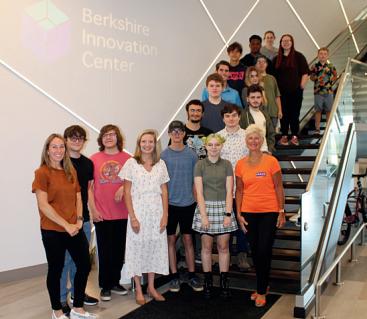







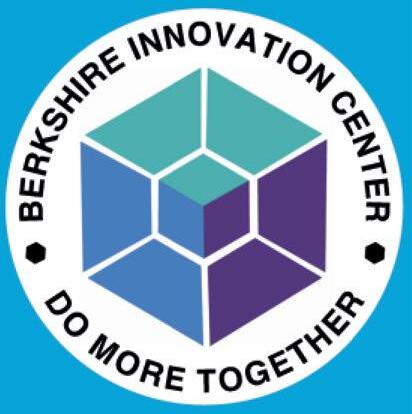


By C laire O’Callahan
High prices and low inventory continue to perpetuate a market that is particularly hostile to first-time homebuyers and those with low to moderate incomes in the Berkshires. Nevertheless, the Berkshire housing market is showing signs of stabilizing as it continues to retreat from its pandemic-era highs.
Small shifts in 2024 slowed the rise in home prices and contributed to an increase in the number of sales countywide, said Sandra J. Carroll, CEO of the Berkshire County Board of Realtors. But historically low inventory persists across property types and the average price of homes continues to climb.
“We’re seeing improvements in inventory, but it’s definitely not a balanced market at this point,” Carroll said. “There’s still a lack of inventory in what we consider the workforce housing price ranges.”
Twenty-one more homes sold in the Berkshires last year compared with 2023, according to the Board of Realtors’ end-ofyear market report. It’s a modest rebound after two years of sales that had slowed to pre-pandemic levels, said Carroll.
The average price for a home in the Berkshires continued its slow ascent in 2024, rising to $482,333, up 2 percent from 2023.
Inventory also rose slightly, but it remains very low with homes staying briefly on the market — three months on average.
“We always considered a balanced market around seven months [of being on the market], maybe even a little bit higher in the Berkshires,” said Carroll.
Across the Berkshires, demand coalesces around one price range: $200,000 to $350,000.
Carroll calls that the workforce housing bracket — homes that people who are making between 60 and 100 percent of the area’s median income can afford without

ANALYSIS: Board of Realtors CEO Sandra Carroll breaks down the market numbers for 2024. Page 15
becoming cost-burdened.
Properties priced in that range, especially the lower end of it, can be difficult to come by.
Only Northern Berkshire County, where the average home sells for $333,835, has a market that can meet this demand.
In Central and Southern Berkshire County, homes sell for $471,085 and $841,158 on average, prices that exceed the budget of many prospective homebuyers.
Homes that are priced within the
“workforce housing” range sell quickly, eliciting multiple bids and staying on the market for only one to three months, far below the balanced absorption rate of seven months.
Homes priced between $500,000 to $750,000 were also popular among homebuyers in Central and Southern Berkshire last year, Carroll said.
Those buyers are often second — or third or fourth — homeowners, and deem the price range affordable in a market where vacation homes often sell for upward of $1 million, said real estate agent Paula McLean.
In Central Berkshire, many people who buy homes in that price range are locals
who are selling their current home to move into something a little bigger, said Nick Geranios, a real estate agent at William Pitt Sotheby’s Realty.
Turning to the new year, Geranios said he is optimistic about the direction of the market. Prospective homebuyers can expect stable interest rates and — in certain segments of the market — a slight ease in the inventory holdup, he said.
McLean said buyers can expect “low inventory, a lot of patience and perhaps some competition.”
“Historically, the spring market brings more inventory,” McLean said. “We’ll see if that continues.”

Guido’s raises over $18K to combat food insecurity
Guido’s Fresh Marketplace customers donated $15,056.06 at the registers in November and December 2024 as part of the company’s “Round Up at Checkout” program.
Along with a $3,000 donation from the Guido’s family of businesses, the company raised $18,056.06 to be shared between seven local food insecurity programs.
The programs include Price Memorial AME Zion Church, Berkshire Dream Center, South Congregational Church, First United Methodist Church, and St. Stephen’s Episcopal Church, all in Pittsfield, and Construct and People’s Pantry in Great Barrington.
Since its inception in July 2020, the Round Up at Checkout program has generated a total of $336,889.27 for local organizations.
The program runs continually throughout the year. Each partner organization has a two-month period in the stores, and all proceeds raised at the registers, along with a $3,000 donation from the Guido’s family of business, go directly to that organization at the close of the time period.
Local organizations can apply for inclusion in the program at guidosfreshmarketplace.com.
PITTSFIELD City earns national honor for digital inclusion efforts
The city of Pittsfield has been named a 2024 Digital Inclusion Trailblazer by the National Digital Inclusion Alliance in recognition of the city’s efforts to close the digital divide. This is the second time Pittsfield is being recognized with this designation.
Recognizing the array of interests and unique barriers of its community members, Pittsfield joins a record number of Digital Inclusion Trailblazers this year. NDIA awarded a total of 60 awardees representing municipal, county and regional governments, paving the way for digitally inclusive communities across the United States.
In an increasingly connected society, digital inclusion — access to affordable high-speed internet, devices and digital skills training — is essential not only to participate in today’s world but also to finding greater opportunities to thrive using tools to navigate the internet confidently and independently.
Trailblazers provide models for other local governments to aspire to as communities build digital inclusion ecosystems.
Pittsfield achieved Trailblazer status by prioritizing digital inclusion for residents of their communities through the following: The award of an implementation grant to start the first phase of its Digital Equity Plan; Tech Talks with the Council on Aging; and a Technology Resource Fair at Berkshire Athenaeum.
For more information about the NDIA, visit digitalinclusion.org.
PITTSFIELD
Hillcrest wins $15K grant from autism foundation
Hillcrest Educational Centers is a recipient of the Autism Community Impact Grant of $15,000 from the Doug Flutie Jr. Foundation for Autism.
The grant is awarded through an application process and historically supports traditionally underserved, underfunded, culturally diverse communities reflected in the Flutie Foundation’s areas of impact.
The Sports Wall purchased with the funds provided by the Doug Flutie Jr. Foundation will serve over 90 students enrolled at Gerard E. Burke Academic Center. Designed to encourage active learning, it offers dynamic, hands-on opportunities that promote engagement, teamwork and sensory-friendly physical activity.
This addition directly supports Hillcrest’s mission to provide compassionate,
individualized education to those with unique developmental needs, fostering their growth and independence.
PITTSFIELD BCC expands professional development workshops, courses
Berkshire Community College’s Workforce and Community Education department continues to expand its affordable personal enrichment and professional development workshops and courses. Spring 2025 courses offer something for all ages, from orthopedic massage to Dungeons & Dragons.
With a mission of helping people succeed in the Berkshire County job market, the Workforce and Community Education department offers a wide range of programs, workshops and services designed to meet the needs of job seekers, career changers and employers.
Workforce training areas include health care and social services courses for certified nursing assistants, community health workers, substance abuse counselors, emergency medical technicians, phlebotomy technicians and more.
Online classes are offered for certified paralegals, human resources professionals, HVAC/R technicians and professional bookkeepers, while corporate solutions training workshops are available for area employers.
Upcoming personal enrichment courses are centered around four core areas: health care; personal growth; art; and youth.
For more information, visit berkshirecc.edu/workforce, email workforce@ berkshirecc.edu or call 413-236-2115.
GREAT BARRINGTON
Fairview Hospital earns Women’s Choice Award
Fairview Hospital, an award-winning critical access hospital of Berkshire Health Systems, has been named one of America’s 100 best hospitals for patient experience by the Women’s Choice Award. The award signifies that Fairview Hospital has been ranked within the top 100 hospitals of similar size, under 25 beds.
The methodology used to select Fairview Hospital as one of the 100 best hospitals for patient experience is unique in that it evaluates specific hospital consumer assessment of health care providers and systems survey results along with primary research about women’s health care preferences.
The Women’s Choice Award collects the data from the survey measures and uses a weighted average to award the best hospitals for patient experience.
The ranking is based on the following factors: effective communication with nurses and doctors; responsiveness to requests for help; providing patient recovery information; explanation about medications before being administered; bathroom and room cleanliness; peacefulness of room at night; and patient recommendation rating.
For the full list Best Hospitals for Patient Experience, visit womenschoiceaward.com/best-patient-experience.
Cigarette recycling bins installed downtown
Downtown Pittsfield Inc. has installed new cigarette waste containers in downtown Pittsfield with funding from Downtown Blooms and support from Pittsfield Beautiful and Mill Town Foundation.
The containers by TerraCycle allow for free cigarette waste recycling. Once collected and shipped back to TerraCycle, the cigarette waste is cleaned and separated by material type. The materials are recycled into raw formats that manufacturers use to make new products. The ash and tobacco are separated out and composted in a specialized process.
Cigarette waste containers are located at the corner of Bradford Street and the corner of Linden Street, as well as at St.
Joseph’s Church, at the seating area by the Berkshire Family YMCA, and there are two by the Ralph J. Froio Senior Center. For more information, contact Downtown Pittsfield Inc. at 413-443-6501.
LENOX
BCD School appoints new trustees
Berkshire Country Day School announces the appointment of new trustees Emma Lezberg, Robert Mulhall and Heather Ryan Gallerstein.
Lezberg is a 2013 graduate of BCD, and subsequently a graduate of Pittsfield High School and Williams College. She is currently a Ph.D. candidate at the Harvard Graduate School of Education, where she researches how schools can best support their undocumented and liminal- status students and prepare them for life after graduation.
Lezberg served previously as a case worker at the Berkshire Immigrant Center.
Mulhall, CEO of Kripalu, has spent two decades developing an expertise in the nonprofit and for-profit sectors. He spent his early career in accounting and finance with PricewaterhouseCoopers before shifting to focus on human leadership and development. Mulhall received numerous awards as a social entrepreneur prior to moving to India to lead innovative global health programming in partnership with UNICEF, the Gates Foundation and the Governments of India, Malawi, Kenya, Ghana and Sierra Leone.
Gallerstein has spent her entire professional career with PricewaterhouseCoopers where she currently is a director. She is an auditor and CPA by background and has spent the past several years in the firm’s Learning & Education department.
All three new trustees serve on BCD’s Finance Committee.
BCD has seen enrollment growth in the last couple of years, rolled out the successful rebranding of the Brook Farm Preschool, and, with the support of donors, has opened a STEAM lab, a Sport Court, and initiated a successful Merit Scholarship program, among other things.
The Lee Chamber of Commerce held its annual meeting and awards banquet on Nov. 4 at Greenock Country Club with a dinner catered by KJ Nosh. In addition to electing board members, the chamber also honored businesses and individuals that have contributed significantly to the local business community.
Returning board members elected to serve three-year terms are Doug Bagnasco of Devon-field Inn and Vincent Vigilante of Jacob’s Pillow. The board thanked David Harrington of Lee Bank for his years of service on the board. Michelle “Shelly” Bombardier of Lee Bank was voted unanimously to the board. She will begin her three-year term in January.
During the awards ceremony, High Lawn Farm was honored as Corporate Citizen of the Year, the 2024 Distinguished Service Award was given to the Lee Library and Anne DelGrande of Terrace Hair Studio, and the Chamber’s Lifetime Achievement Award was presented to Karen Keenan. Recognized as Volunteer of the Year was Susan Gore for her work for the Lee Food Pantry.
GREAT BARRINGTON
The Nonprofit Center of the Berkshires has received a $50,000 grant, over two years, from the Boston-based Barr Foundation.
This grant extends from Barr’s Sector Effectiveness grantmaking, which aims to strengthen organizations dedicated to helping New England nonprofits thrive and sustainably achieve their missions. Founded in 1997, Barr has grown to become one of the largest private foundations in New England.
The Nonprofit Center of the Berkshires serves as a support and infrastructure organization for the regions large nonprofit sector, helping organizations connect, learn and grow. It is
planning for growth to meet increasing demand from nonprofits for higher-level trainings, more networking events, resource-sharing and advocacy.
“This grant is the largest gift in our nine-year history,” said founder Liana Toscanini said. “It’s transformational in that it will allow us to focus on strategic planning and organizational growth to better serve Berkshire nonprofits.”
Learn more about the Nonprofit Center of the Berkshires at npcberkshires.org, and about Barr Foundation at barrfoundation.org/ sector-effectiveness.
SPRINGFIELD Annual Big Y campaign provides 1
Big Y’s annual Sack Hunger campaign has reached its goal of providing 1 million meals to regional food banks.
The campaign provides funds for the four food banks across Big Y’s two-state marketing area. In turn, these food banks support local soup kitchens, food pantries, senior food programs, day care centers and many others of the 2,100-member agencies that they help every day. The goal is to maximize access to nutritious food and other resources that support food security for those at risk of hunger.
Throughout this past holiday season, customers and employees supported Sack Hunger at Big Y supermarkets or Table & Vine Fine Wines and Liquors. Every $5 donation brought 10 meals to those in need of support.
Big Y’s Sack Hunger campaign is part of the company’s ongoing support throughout the year, including almost daily donations of meat, fresh produce and bakery along with grocery, frozen food and dairy items.
The four regional food banks are The Food Bank of Western Massachusetts, Worcester County Food Bank, The Greater Boston Food Bank and Connecticut Foodshare.

A free monthly publication by The Berkshire Eagle 75 South Church Street, Pittsfield, MA 01201 Visit berkshirebusinessjournal.com for advertising information and to subscribe NEWS DEPARTMENT 413-447-7311 news@berkshireeagle com
ADVERTISING DEPARTMENT AMY FILIAULT Advertising Manager 413-496-6322 afiliault@berkshireeagle com
CHERYL GAJEWSKI, Director of Advertising Sales 413-841-6789 413-496-6330 cmcclusky@berkshireeagle com
Share your news with the Berkshire Business Journal. If you have a company promotion, a new business or a new venture, let the Berkshires know about it Remember the 5 Ws and that briefer is better Email text and photos to BBJ@newenglandnewspapers com. Provide your expertise in the Berkshire Business Journal. Do you have the answer to a persistent question about business and the Berkshires? Do you have ideas and suggestions on how our business community can grow? If you have a comment to make about doing business in the Berkshires or if you re looking to raise an issue with the business community this is the venue for that We welcome letters up to 300 words and commentary up to 600 words Send these to BBJ@newenglandnewspapers com
Berkshire Business Journal is published monthly by New England Newspapers Inc., 75 S Church St Pittsfield, MA 01201. Periodicals postage paid at Pittsfield, MA 01201. Berkshire Business Journal is delivered free to businesses in Berkshire County via third class mail. Additional distribution is made via drop-off at select area newsstands

By M aryjane Willia Ms
PITTSFIELD — Several downtown businesses in the arts and culture scene are getting new projects off the ground thanks to state grant money.
The Downtown Pittsfield Creative Alliance has received a $125,000 grant from MassDevelopment through its Transformative Development Initiative Creative Catalyst Grant program.
The Alliance includes The Collab, Katunemo Arts & Healing, Wander Berkshires, Rites of Passage and Empowerment, Let It Shine, and Assets for Artists.
This grant will be used to fund a range of projects aimed at growing Pittsfield’s creative economy, including a community darkroom at Wander, a newly opened queer-owned cafe and event space, said Julie Copoulos, a MassDevelopment Pittsfield TDI fellow who works with many of the organizations involved in this project.
The Let It Shine Public Art Partnership, which was initially funded by a TDI grant in 2023 and has since started working with Pittsfield High School Students, plans to use some funds to bring in a renowned artist to work on a new, large project, said Copoulos.
“We’re creating an environment and ecosystem here where young people are able to imagine and create a new future for themselves,” Copoulos said.
The Collab is a collaborative workspace, art gallery and recording studio that also received a TDI grant to help launch its business. Part of the new grant money will be used to activate the sound studio and fund membership opportunities for Pittsfield youth.
“So now we’re seeing more synergies with young people being able to engage with different public spaces in Pittsfield,” Copoulos said.
The grant will also help fund trips for Pittsfield High School students to visit
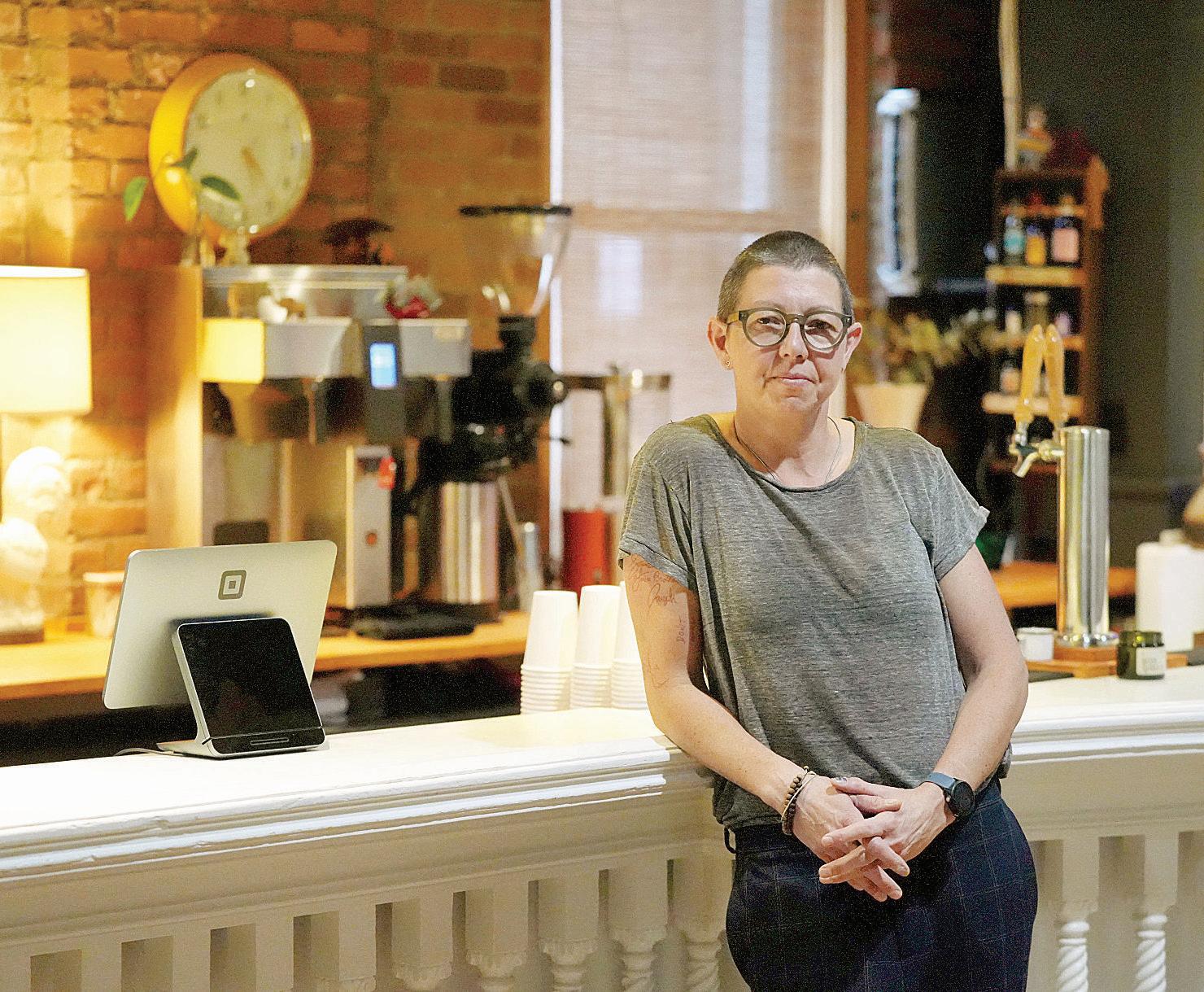
historically Black colleges and universities through Rites of Passage and Empowerment, a mentorship program for young women and nonbinary people. The organization also works to create a space for students who are coming back from college.
Copoulos said the grant will allow Katunemo, an arts collective, to form a formal nonprofit and create paid opportunities for artists to engage in the public space.
“It’s really building a stronger network of artists and creatives across the commonwealth to drive econom-
ic development out of a localized level through the TDI program and district work,” said Pedro Soto, the TDI senior fellow at MassDevelopment for creative economy work.
Soto said Assets for Artists, a program by Mass MoCA, is planning to use part of the grant to fund more resources for artists and entrepreneurs.
“We’re cultivating people who are artists, but these people are also running small businesses,” Copoulos said. “Very often they run in parallel with each other, and so we’re really trying to nurture this ecosystem where there’s a connection
Pittsfield was the highestranking project for this funding and encompassed many of the agency’s goals for supporting creative projects.
between arts and culture, leadership development, small business development and resident engagement.”
Pittsfield was the highest-ranking project for this funding and encompassed many of the agency’s goals for supporting creative projects, Soto said.
He said they were specifically excited about four aspects of the project:
“One was really about growing partnerships among businesses and cultural entities on Tyler Street and North Street, creating safe spaces in Pittsfield for young creatives, leadership development across younger generations, and ensuring financial independence across cultural institutions and small creative businesses,” Soto said.
Pittsfield is one of 10 gateway cities to receive this grant out of 51 applicants. Copoulos explained a gateway city is a post-industrial space that has a lot of access to infrastructure but has experienced historical disinvestment.
Copoulos said the project is really special because it fosters collaboration and “synergy” among some of Pittsfield’s entrepreneurial and creative community.
“It’s about developing young leaders or established leaders in our community, creating network opportunities and learning opportunities for people who live in these spaces, small business and job development,” Copoulos said. “And creating networks between the people existing in these spaces so that they can be stronger together.”
By Sten Spinella
WILLIAMSTOWN — The new property owners for the former Orchards Hotel are intent on filling up its 49 rooms once again.
The developers, Garden Properties & Development LLC, are trying to restore the former four-star hotel, vacant since closing in March 2020, to its past grandeur, according to their real estate broker Adam Field.
An intensive, inside-out rehabilitation effort that began last fall will potentially have the hotel, which will keep its name, ready for a June opening.
“Our clients who bought the hotel, they’re going to do everything. They just put a new roof on it, and they’re going to rehab the whole property,” Field said. “Right now we’re looking for a qualified restaurateur who wants to run the restaurant, the bar, the outdoor dining, the banquet facility, and the in-room dining for the hotel once it becomes active.”
Field and the firm he works for, Cushman & Wakefield, are charged with finding that restaurant operator before the June target opening date. The property listing says the restaurant will be “built to suit the tenant.”
HCC Orchards LLC sold the defunct hotel property at 206 Adams Road, Williamstown, to Garden Properties and Development LLC for $1.5 million in August of last year. The Orchards, a landmark in Williamstown built in the mid-1980s, was well-regarded in its time, with 49 rooms and suites, a courtyard and a full-service restaurant.
According to Field, the developers are experienced hoteliers.
“The first week they owned it, they put a whole new roof on it, you have to start with that. Can’t fix anything inside if it’s leaking,” Field said. “They’re well-funded, they know what they’re doing, and they’re trying to get this hotel going. They want to be a part of the community.”

Construction crews are busy doing work at the former Orchards Hotel and Gala Restaurant in Williamstown in hopes of a June reopening.

The former Orchards Hotel and Gala Restaurant in Williamstown was purchased in August 2024 by Garden Properties & Development LLC. The developers are trying to restore the former four-star hotel, vacant since closing in March 2020.
The buyers were not available for comment on Monday.
The hotel’s closure in 2020 is owed to the COVID-19 pandemic’s effect on the hospitality industry.
In June of last year, Williamstown Police Chief Michael Ziemba told The Eagle that police had found people who had been squatting in the thought-to-be-unoccupied ho-
tel. A caretaker who checked the building weekly believed there were people in there, so police followed up. The people who were living there were charged with breaking and entering, trespassing and vandalism.
“There’s a little checkered history with it,” Field said of the property, which was sold at auction in 2021 after a foreclosure. “It was sold to somebody in South America, they never came up and did anything with it, and it sat on the market a year or so.”
Field added that the general vision for this new iteration of The Orchards is to have it functioning exactly the way it was before.
B y M aryjane W illia MS
PITTSFIELD — If you are waiting for a new restaurant to replace the former Chili’s Grill and Bar on Hubbard Avenue, it might be a while.
When asked to provide an update on the search to find a company to take over its lease and liquor license after the closure of its Pittsfield location, a Chili’s Grill and Bar representative told the Pittsfield Licensing Board recently that there is “nothing new.”
The Chili’s Grill and Bar on Hubbard Avenue abruptly closed on Aug. 13, 2024, after less than six years in business.
At a board meeting in September 2024, Alan Anderson, director of operations in the Northeast for Pepper Dining, said Chili’s is looking for a buyer to carry out its lease and intended to renew its li
quor license at the end of the year, iBerkshires reported.
“There are several interest

The former Pittsfield Chili’s is looking for a buyer to carry out its lease and intended to renew its liquor license at the end of the
demand in Pittsfield since the city cannot create new licenses — they must be transferred.
“There’s an interest that the city of Pittsfield has in having the license used or sold,” said board Chair Thomas Campoli at the meeting. “We have to start putting some pressure on the licensee to do something with the license, because there might be folks out there that could use it.”
The Licensing Board asked Anderson to provide an update by June.

By GreG Sukiennik
PITTSFIELD — Former Berkshire Bank
executive Michael P. Daly has been named CEO at Pittsfield Cooperative Bank, the company has announced.
The news comes just three days after Pittsfield Co-op announced that Jay Anderson, the bank’s president and CEO for 15 years, had stepped down for health reasons.
The Co-op nearly doubled its asset size to $400 million and experienced record profitability in multiple years during Anderson’s tenure, according to a statement released Monday afternoon.
In the news release, Pittsfield Coop described Daly as “a friend and customer of the institution since the 1980s.”
“Pittsfield Cooperative Bank appreciates Mike’s willingness to step in and assist us,” board Chair John J. Martin Jr. said in a statement announcing the move. “We look forward to his help in creating and executing
Daly stepped down as president, CEO and director of Berkshire Hills Bancorp, Berkshire Bank’s holding company, in 2018.
a thoughtful plan for the future and continued profitability.”
A city native, Daly was motivated to step out of retirement by his local roots and friendships in the community and at Pittsfield Co-op, the bank said.
“The spirit of a community bank is its connection to employees, local customers and the community,” Daly said in the release. “That’s what I’m looking forward to most.”
“This arrangement wouldn’t be happening if it wasn’t in Pittsfield, Massachusetts and with Pittsfield Cooperative Bank,” he said. “I have had a long history with the bank, and I am thrilled to return and build on the suc-
cess of this community bank.”
Daly stepped down as president, CEO and director of Berkshire Hills Bancorp, Berkshire Bank’s holding company, in 2018. An employee since 1986, when it was still known as Berkshire County Savings Bank, Daly was named president and CEO in 2002. Under his leadership, Berkshire Bank expanded from a county-focused financial institution to a regional bank with $12 billion in assets.
“I loved my time at Berkshire,” Daly said in the release. “I will always be grateful to my board members and all of the employees for what we shared and accomplished in the community.”
Seven years later, “The chance to return to my hometown with a community bank is a really compelling opportunity.”
Pittsfield Cooperative Bank is one of the oldest cooperative banks in the state and has achieved record earnings four out of five of the last fiscal years. It celebrated its 135th anniversary last year.
The Berkshire Eagle
NORTH ADAMS — MountainOne has promoted Jonathan Denmark to executive vice president of MountainOne Bank.
In addition to his new leadership responsibilities, Denmark will continue to serve as president and chief operating officer of MountainOne Insurance Agency.
Denmark, a Pittsfield resident, will mark 10 years with MountainOne in March. Early in his tenure as pres -
ident and COO of MountainOne Insurance, he led the consolidation of MountainOne’s insurance agencies, True North Insurance and Coakley, Pierpan, Dolan and Collins, and oversaw the rebranding of the combined agencies to MountainOne Insurance.
His efforts also established a strong partnership with OneDigital for the agency’s group benefits business line.
Under his leadership, MountainOne Insurance has continued to expand, acquiring three agen -
cies, opening a new office in Stockbridge, and expanding the agency’s presence to the Pioneer Valley. Denmark’s growth strategy, coupled with his expertise and dedication, have positioned the agency as a core contributor to MountainOne’s overall success.

Denmark
Denmark recently assumed the role of board chair of the Pittsfield Economic Development Authority, which oversees the William Stanley
Business Park. The park is home to the MountainOne building at Silver Lake and the Berkshire Innovation Center. His leadership at PEDA will further align economic growth opportunities with community development in Pittsfield and beyond.
Headquartered in North Adams, MountainOne is the mutual holding company of MountainOne Bank, MountainOne Insurance and MountainOne Investments.


Systems of Adams recently built and installed this manufactured
In the Berkshires, the going price for a manufactured home was $92,888 in 2024. The average sale price for a traditional single-family home was $482,333.
Those who buy into one of the county’s mobile home parks pay monthly bills that can range between $600 and $1,100, depending on lot rent, utility costs and whether they take out a mortgage.
Eleven-hundred dollars won’t cover the going rate for an apartment or the average monthly payment on a mortgage loan for a single-family home in the Berkshires.
of land.
Prospective manufactured homeowners who don’t already own land must consider further costs: the price of the lot itself, the cost to connect utilities and municipal impact fees.
Tacking on those costs cuts some of the advantages of manufactured homes, especially in areas with high land prices, a report conducted by the Joint Center for Housing Studies at Harvard University found.
“No matter how much you save on the cost of the construction, you still have to pay the cost of the land,” said Chadwick Reed, who co-authored the report.
The affordability of manufactured homes has one real threat — the price of land.
Newly built manufactured homes also are more cost-effective than a comparable modular and stick-built home.
At Modular Building Systems, an Adams-based company that builds manufactured and modular homes, a manufactured home costs between $70 and $90 per square foot. Modular homes, which are built in pieces in the factory and assembled on site, range from $125 to $150 per square foot.
Transportation and siting add to those costs, said Corey Bishop, who co-owns the company. Depending on how the home has to travel from the factory and what work needs to be done on site, manufactured homes can cost between $170 and $200 per square foot. Modular homes cost between $325 and $350 per square foot, while stick-built homes — those built onsite, piece by piece — average between $400 and $600 per square foot.
“For most people, new construction is not attainable,” Bishop said. “If somebody comes to me now and says, ‘I’d like to build myself a nice little home,’ I’m going to say to [them], ‘Well, do you have $300,000 to $350,000 for a very modest modular home, not including the land?’”
The affordability of manufactured homes has one real threat — the price
Great Barrington is one of those areas. In 2024, the median sale price for a lot was $250,000, according to Berkshire County Board of Realtors. The median sale price in Berkshire County was $73,000.
‘NOT YOUR GRANDMOTHER’S MOBILE HOMES’
Opponents of manufactured housing in Great Barrington argue that those cost savings undermine the quality of the homes, leaving low-income homeowners with poor living conditions and high maintenance and utility costs.
“If we’re going to provide housing for people, I think we need to provide the best quality housing we can,” said Joseph Hankin, a Great Barrington Planning Board member.
Early on in their history, manufactured homes were often built with lighter and cheaper materials.
But after the U.S. Department of Housing and Urban Development set federal standards for manufactured home safety and construction in 1976, the quality began to improve.
Today, manufactured housing ranks slightly below site-built homes by most measures, but research has consistently found that the quality of well-maintained manufactured homes can be equivalent to that of site-built homes.
on a








Studies conducted over the past few decades show that manufactured housing offers a promising entry into homeownership for people with low and moderate
and dispute the persistent belief that manufactured homes lag far behind traditionally built homes in quality.
“There’s really no data to support that modern manufactured housing is lower quality than site-built homes,” Reed said.
Bishop likens the manufactured homes his company builds today to the traditional single-family homes built a decade ago.
Manufactured homes are slightly behind modular and stick-built homes when it comes to energy code since they are built to HUD standards, not state and local building code, said Bishop.
“There have been a lot of changes in the energy code with new construction,” said Bishop. “With new construction now you have whole house blower door testing, you have air exchange systems that have to be installed by code, you have to have future space in your electrical panels for future car chargers.”
The list goes on.
While manufactured homes are not required to meet Massachusetts extensive energy efficiency requirements, Bishop said they are still fairly efficient, and buyers can order them to be Energy Star-rated.
“These are not your grandmother’s or grandfather’s mobile homes any longer,” Bishop said.
At Titan Homes, a manufacturer in Sangerfield, N.Y., all manufactured homes go through a three-step quality review by members of Titan’s staff, a third-party inspection agency and an independent inspector that reports straight to the general manager, said Jim Davis, who manages sales for the company.
“Between those three elements, that keeps quality at a very high standard,” Davis said.

Studies have also consistently found that when residents own both the home and land, manufactured homes appreciate at a similar rate as site-built homes.
FURTHER SAVINGS AS ADUS?
The affordability of manufactured homes faces one significant stumbling block — the price of land.
If Great Barrington moves forward with the Affordable Housing Trust’s proposal to loosen its “unnecessarily re-
“These are not your grandmother’s or grandfather’s mobile homes any longer.”
Corey Bishop, owner of Modular Building Systems
strictive” regulations on manufactured housing, the high cost of land in town could still prevent people from buying manufactured homes.
Especially since the town is not considering the most affordable option for manufactured homes — the creation
of a manufactured home park where individuals are not required to foot the land cost.
But the trust has proposed another way for prospective manufactured homeowners to circumvent these costs — allow manufactured homes as accessory dwelling units.
Doing so could spur the development of ADUs, a tool the town and state think could ease the housing crisis, trust member Joseph Method said.
Whether that idea has legs is yet to be determined.
“Our accessory dwelling unit legislation has specific square footage requirements, and we are not sure if mobile homes, which come as a pre-manufactured unit can meet those square footage requirements,” said Brandee Nelson, chair of the Planning Board.
By GreG Sukiennik
PITTSFIELD — It didn’t take Berkshire Crossing very long to fill the space vacated by Staples in December.
Burlington Stores, formerly known as Burlington Coat Factory, told The Eagle it plans to open a store in that space this fall.
“We are thrilled to bring a new store to the Pittsfield community, offering residents our everyday low prices on a wide assortment of brand name merchandise for the entire family and home,” said Julia DePillis, a spokesperson for the company. The company did not have additional information to share, she said.
The city’s Zoning Board of Appeals unanimously approved an exception for a 146-square-foot sign for the business. Burlington already has obtained a building permit for the 17,650-square-foot space at 555 Hubbard Ave., according to Pittsfield Building Commissioner Jeffrey Clemons.
Staples, which closed its Pittsfield outlet on Dec. 13, was among Berkshire Crossing’s original tenants when the shopping center opened in 1995.
The proposed sign incorporates the business’ heart inside a stylized “B” logo and the message “Deals. Brands. Wow!” The city sign ordinance would have limited the sign to 100 square feet.
In the hardship application, submitted on Burlington’s behalf by Blair Sign Programs, the company noted the building frontage sits more than 1,000 feet from any public right of way, and is partially concealed by trees and other buildings. The increased size would be “equal and competitive” with the shopping center’s other major tenants, the company argued.
On Burlington’s website, Pittsfield is not yet listed on a map of 35 grand openings scheduled for the coming

year. The opening closest to the Berkshires is slated for Feb. 28 at Holyoke Crossing, a shopping center just north of the Holyoke Mall.
Burlington Stores Inc. is a unit of Burlington Coat Factory Warehouse Corp., headquartered in Burlington Township,
N.J. The company describes itself on its investor relations page as “a nationally recognized off-price retailer,” placing it in the same market niche as TJ Maxx and Marshalls, both owned by The TJX Cos. Burlington says it operated 1,103 stores in 46 states, Washington, D.C., and Puerto Rico as of the end of the third quarter of
fiscal 2024.
It describes its offerings as “an extensive selection of in-season, fashion-focused merchandise at up to 60 percent off other retailers’ prices, including women’s ready-to-wear apparel, menswear, youth apparel, baby, beauty, footwear, accessories, home, toys, gifts and coats.”

By Jane K aufman
LEE — Nestor Perez and Sandra Sosa
opened the doors of their third restaurant in the Berkshires, Agaves Mexican Grill, at 30 Housatonic St. just before the new year.
In July, the husband and wife team paid $550,000 for the building, formerly occupied by Athena’s Restaurant & Pizzeria. The couple carried out an extensive interior renovation to get Agaves Mexican Grill ready for the opening.
Their other restaurants are in Great Barrington: Fiesta Bar and Grill at 284 Main St., and Agaves Mexican Grill at 389 Stockbridge Road. Both operate out of rented space. The Lee location is the first restaurant in which they also own the real estate.
Perez, who is from Oaxaca, Mexico, is the head chef of all three restaurants, developing the menu and recipes for the group. Sosa offers the face of the company.
Fiesta opened May 28, 2011. During the COVID-19 pandemic, the restaurant closed in March 2020 during the mandated shutdown. That didn’t last. Sosa said she received so many requests from customers who promised to support the restaurant that it reopened for takeout.
“And it was only my husband and I, and my son,” she said.
Then, on Aug. 6, 2020, Perez and Sosa opened Agaves in Great Barrington.
“A lot of people thought that we were out of our mind to open up another restaurant right in the middle of COVID,” she said. “But pretty much we have faith in ourselves that we are great at what we do and the opportunity came and we took it.”
Each of three restaurants has 84 seats and a staff of between seven and 15, with Agaves in Great Barrington having the most. The entire team encompasses 30 to 35 employees.
On opening day, staff from all three restaurants came to Lee and put on sea-green Agaves T-shirts for the ribbon cutting.
Sosa described the Lee menu as representing a mix of the two Great Barrington restaurants, “plus extra.”
Menu items will be similarly priced to those at Agaves in Great Barrington, with appetizers ranging from $7 for Mexican street corn to $17 for steak nachos, salads starting at $16, street tacos for $11, and plates from $14 to $45.
Sosa said she expects the biggest challenge of owning three restaurants is staffing and “keeping myself calm.”
Sosa, 45, came to the United States when she was in her mid-20s. Her first restaurant job was a hostess for Ruby Tuesday. She met Perez at a different restaurant, where he worked in the kitchen and she in the front of the house. The two were married in 2016 at Fiesta.
The most popular entrée is Perez’s al pastor tacos, which features marinated pork and fresh pineapple.
Perez said sourcing ingredients can sometimes present challenges. This summer, when there was an avocado shortage, staff drove to Poughkeepsie, N.Y., to buy them.
Sosa said her favorite part of owning

If you go ...
What: Agaves Mexican Grill
Where: 30 Housatonic St., Lee
When: 11 a.m. to 9 p.m. Monday through Saturday; 11 a.m. to 8 p.m.
Sunday Phone: 413-349-4412
restaurants is seeing her customers happy.
“They make my day,” she said, adding that she enjoys the compliments. “It helps my heart.”
Lee already has several restaurants featuring Central American or Mexican flavors. Is Sosa worried?
“No, I think competition makes you better,” she said. “I strongly believe that.”
Sosa said their dream had been to own a restaurant building.
“Here I am being successful,” she said. “I want to be able to say, I have one building that is mine. And I don’t know, I might grow old here.”



By C larenCe Fanto
STOCKBRIDGE — Since 1970, Heirlooms Jewelry — a shop tucked into the back of The Mews at 36 Main St., near Once Upon a Table — has maintained a robust presence within the compact downtown business center.
That presence continues in 2025 — with new owners.
After 25 years of co-proprietorship, Philip Coleman and his wife and shop owner, Robin Fleet, retiring after the close of business on New Year’s Eve.
Without skipping a beat, Stockbridge native and current Lee resident Shaun Hall and his wife Ella, the new owners, opened the doors around 11 a.m. on New Year’s Day, with the intent of being open year-round, seven days a week.
During a recent conversation on a busy day inside the brightly lit store, the foursome made it clear that very little will change following a smooth transition. Heirlooms counts on repeat visits by longtime steady customers, said Coleman.
“It’s a business that people love,” he said. “This has been our best years.”
Why sell it now? Coleman and Fleet are retiring to a condo they’ve purchased at a chateau in the Loire Valley of central France — where they had been frequent visitors for 50 years. “It’s a lovely spot,” said Coleman after acknowledging that leaving the store and the Lenox home they recently sold would be bittersweet.
He had been ready to retire several years ago, but Fleet was not. “This store has been like a second child,” she explained. What did it take to persuade her? “He found the chateau!” she exclaimed.
“We’ve met thousands of people from all over the world,” Coleman pointed out. “We’re going to miss the people and the good times with literally thousands of frequent customers who love the store and feel like they’re dealing with regular people. It’s a cool, fun place.”
He said the store completes more than 5,000 sales annually, with tens of thousands of customers passing through.
Fleet recalled one of her favorite moments, when a customer gifted a $250 piece of jewelry to a total stranger who had been looking it over but deemed it unaffordable. “I’m doing it because I can,” said the customer. “It was just a complete gift,” Fleet recalled.
The business, originally called Folklorica, was started by Ellen Kenwood, taking over a space first occupied by fashion designer Nicole Miller.
In 1980, Minna Zaret, the second owner, bought it, renaming it Heirlooms Jewelry. Befitting its name, the store always has specialized in antique and estate jewelry — “anything that’s technically not new,” Coleman explained. The stock is acquired from wholesale jewelry dealers, local estates, trade shows and events such as the Brimfield antique show.
Coleman, a Philadelphia native, met Fleet, who grew up in Jacksonville, Fla., in first grade after his family moved there. They’ve known each other for 64 years and have been married for 40, moving to the Berkshires to raise their daughter.
Fleet, stopping at Heirlooms to look for a ring, returned a week later, encountered a sign for a “closing” sale and bought the business from Zaret in October 1995, paying about $130,000 for the value of the business and the inventory.
Last summer, the Halls had considered buying it, Shaun explained, but it didn’t work out. On the day after this past Thanksgiving, with some revisions, the deal was consummated.
With 75 percent of the store’s inventory sold since last January, the price of the business transaction was $50,000, said Coleman. The building is owned by a subsidiary of William Gottlieb Management LLC. Shaun Hall, born and raised in Lee but with deep family roots in Stockbridge, noted that his father and grandfather were models for Norman Rockwell. “We are very happy to be part of the community,” he said.
A year ago, just a pebble’s throw from Heirlooms, Hall purchased 7 Arts Music, a record store specializing in vinyl,



including half of his personal collection of 30,000 discs, which includes CDs and some vintage 45s and 78s. Customers call it “a walk down memory lane,” he said, with albums including ‘60s and ‘70s rock as well as classical and jazz.
His wife Ella is a native of Armenia whom he met while in the Peace Corps teaching English from 1998 to 2000 in Armenia. Ella was among his students prior to their marriage. They’ve been raising four daughters in Lee, now ranging in age from 16 to 22.
Ella, who teaches seventh grade English Language Arts at Lee Middle and High School, will keep that job despite her new role as co-proprietor of Heirlooms. The Halls have been apprenticing with Coleman and Fleet, learning how to run the business.
“It will be a juggling act,” Ella conceded, “but I’m a hard worker and these are my passions — teaching and being surrounded by jewelry.”
Her husband, who will keep his parttime job at St. Mary’s School in Lee, and their oldest daughters, Liana and Ariana, will take their turns running the store.
Heirlooms Jewelry will continue to be open from 11 a.m. to 6 p.m. on weekdays, and 11 to 8 Fridays through Sundays. A revamped website, heirloomsjewelry. com, will be online soon, complementing the store’s Facebook page.
“We have a lot to grasp and learn,” Ella said. “Eventually, I’d love to bring in jewelry from around the world.”
Coleman and Fleet will be available for consultation even after they’re ensconced in the French chateau. “I have his number,” said Shaun, though he’ll bear the six-hour time difference in mind.
“We’ll keep everything here exactly the same, the service and everything customers are used to,” he said. “This store has been a part of Stockbridge history for a very long time.”
Heirlooms Jewelry is the second-oldest business in Stockbridge. Williams & Sons Country Store holds pride of place as the first, established about 60 years ago.
“We’re keeping the legacy,” Ella said. “We wish Robin and Phil the best of luck, and we’re really thankful to them for their guidance and support.”



By Jane K aufman
LEE — The first time Rebecca Bliss Lilley made scones at the former Birchwood Inn in Lenox, she flubbed it. Unfazed, she learned and improved. It didn’t take long for her to get the hang of baking.
Then she got hooked. About 20 years ago, she started to cook up a dream of opening a tea room.
Meanwhile, she moved up through the ranks of the Berkshires hospitality industry. She’s been the innkeeper at 33 Main in Lenox and has most recently served as area human resources manager for the Red Lion Inn.
On Jan. 12, she opened Bliss Crumbs & Coffee at 77 Main St., with help from her children, husband and family. That day was busy, but so has each day since then.
Lilley, 45, awakes in time to get to the business by 4 a.m. and does her morning bake of 50 to 60 items in a tabletop convection oven.
In her first week, by 7:30 a.m., customers, the most she’s ever seen before, are lining up for coffee, tea and monkey bread muffins, gluten-free blueberry muffins, chocolate chip cookies she bakes from scratch, along with croissants created by Berkshire Mountain Bakery that she also bakes. She sources her espresso and medium roast from Barrington Coffee Roasting Co. Her dark roast and decaf come from No. 6 Depot.
A DREAM COMES TRUE Bliss Crumbs & Coffee operates out of a former T-shirt shop.

Plumbing was the biggest expense and took the longest.
The business is named after Lilley’s maiden name along with the family’s beloved dog, Crumbs, a Labrador-beagle mix, who died a few years ago.
Lilley is almost a one-woman show at the moment, although her mother and husband are helping out in her first weeks.
As the weather warms up in the spring, she’s got a list of people willing to take shifts.
However, she has no aspirations to get fancy.
“I will never decorate cakes,” she said. “It’s not my jam.”
Lilley was born in Lawton, Okla., but grew up in Lee graduating from Lee High School. Her
first job was as a hotel maid.
In 2024, everything came together for Bliss. The same week she decided to pursue her own business, the opening at 77 Main was advertised.
“I just decided that this was the perfect space,” she said. “I like the windows. I like the light that comes in. I like where it’s located on Main Street.”
Lilley’s husband, Kevin Lilley, fashioned a pine bar. With high ceilings, wood floor and a cerulean blue back wall, the shop feels both sleek and comfortable. It seats about 20 maximum. It also offers free Wi-Fi.
CATCHING ON
Nancy Thompson, of Lenox,

came in for the first time Friday after cousin Sandra Sloane, of Pittsfield, pitched the idea after seeing a post on a friend’s Facebook page.
“We’re nosy and we wanted to see what it was all about,” Thompson said.
The cousins and their husbands sat down at a table with their coffees to chat.
Lilley recognized second-time customer Danielle Giroux’s face when Giroux came to the cash register with friend Matt Schmitz.
“I don’t even know what monkey bread is, I just had to have it,” Schmitz said, as he settled in at a table with Giroux, who’s housesitting in Becket. “Pretty damn good.”
If you go
What: Bliss Crumbs & Coffee
Address: 77 Main St., Lee
Hours: Sunday, 7 a.m. to 2 p.m.; Monday to Saturday, 7 a.m. to 3 p.m.
Upcoming events
Book club: Feb. 11, 6 p.m. “Onyx Storm,” by Rebecca Yarros.
Decorate valentine cookies: Feb. 13, 4 p.m.
Knitting circle: Feb. 25, 6 p.m.
To participate in events, RSVP by email to blisscrumbsandcoffee@gmail. com.
That muffin is made with cinnamon and brown sugar and biscuit dough.
Lilley has three events lined up in February already for the eatery.
What’s the best part?
“I think just the support from everybody has been really surprising in a good way,” she said, adding that people she doesn’t know have shared her Facebook post to get the word out.
“It’s just been really lovely.”
And her biggest pleasure?
“I think just accomplishing my dream and my children to see that a woman and a mother can accomplish their dream,” she said. “It’s been so long I’ve wanted to do this.”


In 2024, Berkshire County saw a slight increase in real estate activity compared to the previous year. Residential, condo, multi-family, commercial, and land sales rose by 1 percent in the number of transactions and 3 percent in dollar volume.
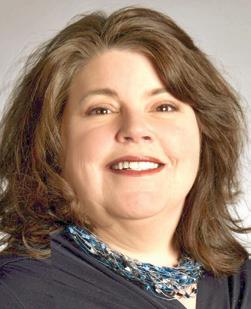
Following the pandemic-era buying peaks of 2020-21, sales had slowed to pre-pandemic levels in 2022 and 2023. However, 2024 marked a modest rebound. Sales of habitable property types — residential, condo, and multi-family homes — experienced increases, while commercial and land transactions declined.
Central Berkshire: Number of sales increased by 5 percent; dollar volume rose by 10 percent.
Southern Berkshire: Sales grew by 7 percent; dollar volume increased by 1 percent.
Northern Berkshire: Transactions fell by 10 percent, with a 7 percent decline in dollar volume, returning to 2018-19 levels.
Berkshire County Realtors report that while the market has slowed from the pandemic frenzy, inventory shortages continue to challenge buyers. There remain more buyers than properties available in hot price points yet buyers remain selective and hesitant to purchase properties perceived as overpriced. Factors influencing the market include limited inventory, higher mortgage rates, inflation, nationwide debt, and more cautious buyer behavior. Despite these challenges, real estate remains a critical economic driver in the Berkshires.
RESIDENTIAL REPORT
In 2024, the number of home sales increased by 2 percent compared to the previous year, rising from 1,112 to 1,133 transactions. North County sales started strong but declined in the third quarter, resulting in a 6 percent drop in single-family home sales — the largest decrease among all regions in the Berkshires. Meanwhile, both Central and South County saw growth in single-family home sales, with Central Berkshire

leading the way, driven by strong market performance in Pittsfield. The annual single-family market reached $546 million in total sales. Additionally, average sale prices continued to climb across the region.
CONDOMINIUM REPORT
Condominium sales in southern Berkshire County saw a dramatic rebound in 2024 after a significant decline in 2023. The number of units sold doubled, and the total dollar volume increased by 51 percent, reflecting a strong, positive momentum. However, despite these gains, the average sale price fell compared to last year’s unusually high levels.
In Northern Berkshire, the condo market continued to face challenges. A total of 51 units were sold in 2024, unchanged from the previous year, showing no significant change in transaction volume.
Central Berkshire remained steady in the number of condo sales, but the market saw a notable shift with a 27 percent increase in the average selling price, highlighting strong growth in value for the area.
MULTIFAMILY REPORT
Multifamily sales in 2024 were strong across Berkshire County, with only
minor declines in the number of units sold in Northern Berkshire and in dollar volume in Southern Berkshire. Otherwise, the market showed robust performance compared to the previous year.
While sales remain below the pandemic-era highs, the multifamily market appears stable. The average selling price for 1- to 5-unit buildings increased by 4 percent, reaching a countywide average of $255,307.
LAND SALES OVERALL DOWN 11 PERCENT, DOLLAR VOLUME DOWN 12 PERCENT
South County land sales surged in 2024, bucking the downward trend seen in other areas of Berkshire County. After several robust years, the land market began to contract in 2022, continuing into 2023.
However, 2024 brought a turnaround in South County, with double-digit increases in both the number of parcels sold and the total transaction value.
In contrast, land sales in Northern and Central Berkshire experienced significant declines. The ongoing challenges of high building costs and strict codes make it difficult to address the demand for workforce-priced housing.
As building costs remain uncertain, monitoring permits and construction
opportunities is critical to meeting the pent-up demand for homes in popular price ranges.
COMMERCIAL NUMBER OF SALES WERE DOWN 19, DOLLAR VOLUME DOWN 18 PERCENT
The nationwide commercial market has faced significant challenges since the pandemic, influenced by work-fromhome trends and business closures. This volatility has resulted in fluctuating sales, with increases in 2021, a dip in 2022, and a recovery in 2023. Entering 2024, expectations were uncertain, and the year ultimately saw double-digit declines in both the number of commercial properties sold and their overall value. These decreases were largely driven by struggling commercial markets in Northern and Southern Berkshire. In contrast, Central Berkshire saw an uptick in sales compared to the previous period. Note: This data reflects only commercial sales listed on the MLS for Realtor-assisted transactions.
HOME REPORT: SALES JUMP IN CENTRAL AND NORTH BERKSHIRE
For the first time in our Market Watch, we are including a report on mobile home transactions. While these transactions involve personal property rather than real estate, mobile homes provide an important housing option, particularly in North and Central Berkshire markets.
Understanding this segment helps paint a more complete picture of available housing and solutions for residents seeking affordable alternatives. Please note: Mobile home data is not included in the overall market reports that encompass all property types as we consider it personal property.
Note: The Berkshire MLS also tracks data on business opportunity sales, commercial leases, and, as of 2023, residential long-term rentals (defined as leases lasting more than 30 days). The entire 2024 Market Watch with historical and town by town data can be found at www.BerkshireRealtors.net
Sandra J. Carroll is the chief executive officer of the Berkshire County Board of Realtors and the Berkshire County Multiple Listing Service.
I often hear from people that their home was the best investment they ever made. They bought it when they were starting a family, lived in it for a couple decades, and now it’s appreciated quite a bit.

The typical home price in the United States has roughly doubled in value in the last 20 years. For example, if you bought a home for $250,000 in 2005 and the value grew at the same rate as the national average, it would be worth about $506,000 today. That’s a hefty $256,000 gain just by living in a home.
According to data for the Pittsfield metropolitan statistical area (MSA), home prices have appreciated slightly less but are still up more than 90 percent in the last two decades. The bottom line is that being a homeowner has been a great way to grow wealth. The home is also the single largest asset for most people. This all leads to a perhaps accurate conclusion that buying a house was the best investment for many people.
But it turns out that real estate has not seen returns anywhere near as good as the stock market. The 102 percent total return on real estate going back 20 years equates
to 3.6 percent annualized.
The growth in the value of a typical home over the last 20 years is hardly better than the rate of inflation. This is true going back further in history as well, as the typical rate of return on the value of real estate is generally in the 3 to 4 percent range no matter what data you look at.
The stock market, as represented by the S&P 500, has returned 10.3 percent per year in the past 20 years, also in line with long-term averages. This equates to a total return of more than 600 percent since the beginning of 2005. In other words, the same $250,000 investment 20 years ago would be worth almost $1.8 million — a much better investment than a home (excluding any fees and assuming the reinvestment of dividends).
Why, then, do we tend to think of a home as such an excellent investment?
The first reason is that buying a home is generally a long-term investment. You don’t look at the market value of your house and think about selling it every day. You put money into your home every month in the form of a mortgage, and although the value grows relatively slowly, buying a
home almost forces you to be a longterm investor.
The same cannot be said of investing in the stock market. The value fluctuates wildly from day-to-day, and you can choose to sell at the click of a button. One of the biggest obstacles for investors in the stock market is their own behavior. Even though the average annual return for stocks has been about 10 percent over long periods of time, there is a pile of evidence that actual investors have not fared that well. The trouble is that people can buy and sell too easily, and they tend to do so at the wrong times.
A second major reason that houses tend to be good investments is that most people use a mortgage to buy a home. This leverage means that you didn’t need the entire $250,000 to buy a house 20 years ago, maybe you only put down a $50,000 downpayment. This makes a large investment more attainable.
But a large investment in the stock market could be equally attainable with the right mindset. If you take the same idea of paying a monthly mortgage and instead put that money toward buying into the stock market systematically, you would have seen
impressive growth over the longterm.
This method of investing a set amount at regular intervals is called dollar-cost averaging, and there are reasons to believe that it can have a strongly positive behavioral impact as well. You’re less likely to worry about the fluctuations in daily value when you get an opportunity to keep adding to investments over time.
If homeownership is attainable, it can be an excellent way to build wealth over time. Of course, you can’t live in the stock market, and ownership in mutual funds and exchange traded funds is not tangible. Nonetheless, we could learn an important financial lesson from folks who have seen their home values grow.
It’s not necessarily that homes have appreciated at an exorbitant pace. Rather, it is the ability to put the money in at regular intervals and not let daily, monthly, or even annual fluctuations in value deter you from holding it for the long term. We should aspire to do the same with all our investments.
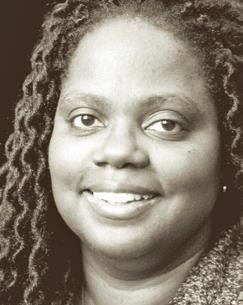
Now what? That’s the question on my mind since the election. It’s a question institutions are asking as well. As I’ve searched for others who want to tackle this question head on, I want to thank Liana Toscanini of Nonprofit Center of the Berkshires for inviting me to be a guest writer.
Gwendolyn Hampton VanSant
As we enter 2025 with a changing political and economic landscape, I’m mindful of the journey my organization Bridge has been on as well as our commitment to be a catalyst for change to foster thriving workplaces and communities. Whatever the challenge, we’ve been prepared. Indeed, we’re always preparing to be in community, collaborating and problem-solving. Steady commitment is what wins this race. It helps us weather the storms, grow deeper roots and innovate — building new pathways, partnerships and structures for thriving.
As both a business and nonprofit leader and a trusted advisor to executive directors, CEOs and HR team leaders, I spent 2024 reflecting on our ripples of impact (ROI) that Bridge has had on our most vulnerable communities as well as our local, regional and national landscape. What’s most remarkable to me is the sustained effort we’ve shown — through many challenges of national leadership, natural disasters the pandemic and brutal violence and disruption — to prioritize the well-being of our most vulnerable populations.
STEADY COMMITMENT
What’s been most useful in this work are the business, governmental and private partnerships (Barr Foundation Creative Vitality Project and our cultural institution partners BTCF, Greylock, Berkshire Bank, Crane Foundation, MDA, and our philanthropic community) that reallocate resources of attention, money and literal physical and air space for me and my peers (e.g. Blackshires, Berkshire Black Economic Council, Latinas413 and NAACP) to support our missions and vision.
Given proper resources and adequate environmental factors, most people know how to solve their most daunting issues. This is what we teach at Bridge. We also ask, who is missing from this conversation that needs to be a part of it? Our conversations are different and more effective because we are firstly representative, inclusive and holistic.
Change is upon us again now. Our attention must arc toward justice, safety and belonging so we can maintain momentum and sustain the courage not to go backward or toward comfort in times of struggle. Courage is hugely necessary if we want to stay in the work of justice for the long haul. It’s an inclusive leadership trait fundamental to change.
Through our collective pandemic journey, we proved that adaptive change is possible. We know this leads to positive social impact and transformation (i.e. new jobs, new voices, new institutions and new leadership). For a rural area, we’re a scalable example of what cross-sector equity and belonging agendas can accomplish for a community.
THE SHIFTING LANDSCAPE OF DEI
In 2024, we discussed the shifting landscape of Diversity, Equity and Inclusion. The bottom line? The essence of all of these efforts is an aligned attention to creating safety and belonging for all employees. We want to grow the capacity to discern the barriers and identify strategic fixes in the short and long-term.

— THE
Participants from “Berkshire Connect,” a program of the Inclusive Leadership CohortIDEA Institute, try their hand at modeling with clay during a 2022 event at Chesterwood, the Stockbridge home of sculptor Daniel Chester French. The ILC is a peer-led accountability group for leaders and boards doing equity and inclusion work.
This work improves the bottom line, ie the traditional return of investment (ROI). And we know that the most impactful leaders are those who tend to culture by creating psychological safety for all employees’ well-being, livelihoods and career paths while building trusted relationships with all communities and stakeholders.
What strategic, well-supported DEI has offered is strategies to correct prior exclusions and rectify inequities while securing the relevance and longevity of their institutions. However this work takes shape in the future, leaders who have authentic, resourced commitments will continue the work of equitably supporting teams and individuals.
They will continue to model how to navigate intergenerational workforces, new workplace cultures with hybrid habits, multicultural teams and shifting resources. Employee Resource Groups will remain an essential structure for belonging.
ACCOUNTABILITY AND RIPPLES OF IMPACT
In 2018 I was invited to speak at the National PolicyLink Equity Summit about organizing in rural areas with three leaders from California, Kentucky and New York. Among other things, we discussed investments in the arts.
I remember, I wrote a note to myself to bring what resonated with me about results-based accountability and community-centric leadership to business and philanthropic leaders in the Berkshires, for example, my colleagues John Bissell, Lori Keily and Peter Taylor. I needed their help to bolster truly inclusive leadership in the organizations I was working with. That’s when the IDEA Institute at Bridge: Inclusive Leadership For Social Change was born.
The ILC is a peer-led accountability group for leaders and boards doing equity and inclusion work (with a gender, class, and race lens) facilitated by myself and Aseante Renee. It took two years to build and we launched despite the pandemic. In Year 1, 30 organizations participated — 12 from the arts.
We ended after two years later with 24 organizations total, nine from the arts sector. The impact has been incredible. We bolstered each institution’s commitment to equity and belonging with demonstrable, measurable shifts. We had four cross-sector projects emerge with impacts like diverse board leadership, increased supplier diversity usage, and integrated arts audiences.
Bonus tracks included the new nationally recognized Pay Equity Initiative. This emerged from a fifth group that formed on their own and the BTCF Equity Initiative whose creation Bridge catalyzed and stewarded through the Berkshire Taconic
Community Foundation. The outcomes are phenomenal, long-lasting and still growing.
The Pay Equity Coalition: Led by WAM founder and former Artistic Director Kristen van Ginhoven and stewarded by consultant Aron Goldman, this has grown in Berkshire and Columbia County and increased its membership.
The Equity Fund at BTCF: This has almost $500,000 in its fund with a new commitment from the board on the horizon. The BTCF board had made its largest contribution
at $300,000 to launch the fund led by leaders of color in Berkshire, Columbia, Northeast Dutchess and Litchfield counties, serving communities of color. More than $120,000 has been awarded to date.
The Solidarity Projects at Bridge: Since the COVID-19 pandemic and the Black Lives Matter uprising after George Floyd’s murder, Bridge has built its infrastructure and made meaningful impacts including culturally specific food access and security efforts for communities of color. We’ve built transitional supported housing partnerships and a wellness initiative as well as community kitchens, a meeting house, farm and garden. Our solidarity economy model is growing.
MINDFUL CELEBRATION
As we celebrate the work we’ve done and practice pivoting and adapting yet again while staying focused, we must acknowledge our housing and socio-economic crisis in the Berkshires and all over. It’s our collective responsibility to provide healthy community environments for all.
I celebrate our clients and partners that receive national recognition in the DEI and community engagement space because it’s a shared win. I want to specifically congratulate and thank John Bissell at the AACU (GFCU) and Pam Tatge of Jacob’s Pillow. No matter the political landscape, remember, we have work to do at home. I know this essential work will continue to ripple out positive shifts and change.
Gwendolyn Hampton VanSant is CEO and founding director of Berkshire Resources for Integration of Diverse Groups and Education (Bridge).

At the end of each month, which question do you ask yourself?
Question #1: I have so much money lef t over, I don’t k now what to do with all of it …or
Question #2: I have little lef t to show for all my hard work af ter I pay all of m y expenses
If you checked #2 – you need to call me to see how much your monthly credit card processing fees can be reduced.
I have been ver y successful in saving over 65 local business owners money each month. I can provide you with a free, no obligation analysis of your current credit card processing program and see how much money I can save you

References available Member of 1Berkshire, Lee Chamber of Commerce and the Southern Berkshire Chamber of Commerce
A growing body of research and consumer trends is outlining shifting attitudes in how women approach their health and wellness, particularly during menopause and perimenopause. Some 6,000 omen officially hit menopause every day in the U.S.
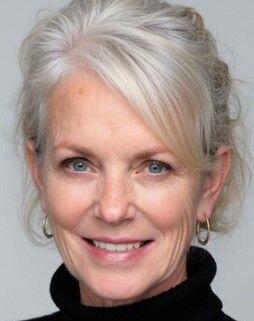
Meg Sanders Cannabis Corner
That’s 1.3 million women each year. Yet, only 31 percent of OBGYN programs include a menopause curriculum and just 29.3 percent offer dedicated time in a menopause clinic for trainees.
With that in mind, and noting that women will spend approximately a third of their lives in some stage of menopause, there has never been a better time to discuss the various ways Berkshire cannabis businesses can service this demographic.
Recent data from the Brightfield Group shows that 53 percent of women who consume cannabis are doing so to manage health and wellness needs.
Of these, a significant portion is using cannabis to address symptoms associated with menopause, including sleep disturbances, anxiety, chronic pain, and hormonal imbalances.
Another survey conducted by New Frontier Data revealed that 60 percent of women aged 35-54 consider cannabis a viable alternative to traditional medications. A 2022 study published in Menopause: The Journal of The North American Menopause Society found that cannabis use was associated with a reduction in common menopause symptoms, particularly those related to sleep and mood.
And that tracks with what my team and I have seen first hand while talking with our customers at Canna Provisions in Lee. We hear from more and more
Many women remain hesitant about using cannabis due to lingering stigmas or a lack of knowledge.
women who are turning to the availability of safe, legal cannabis products to help with menopausal and perimenopausal symptoms and their transitions in life, and are eager to learn about what products or alternatives they can learn about. So it behooves the local industry here in the Berkshires to recognize this significant portion of the female population and their unique needs.
Put another way, it’s an opportunity not only for legal cannabis businesses operating in the Berkshires, but for the region as a whole which is already known for being a haven for the wellness-minded. Even Kripalu and other wellness focused businesses in the Berkshires are providing some type of support for menopausal women, and that trend is only likely to increase.
PHYSICAL, EMOTIONAL CHALLENGES
Thanks to its natural resources, wide open spaces, and seasonal tourism crowds that provide revenue and add to the cultural vibrancy here, the entire Berkshires community can add the legal cannabis industry to the roster of ways its reputation as a wellness leader and business lodestar continues to precede it. Namely, by better serving its 35,000+ local women over the age of 45 (noting demographic trends show roughly 25 percent of women in Berkshire County are over 65), and in turn servicing the greater numbers generated by seasonal tourism.
In Berkshire County, the
potential for being a trendsetter in serving menopausal women seeking information and products is particularly promising. Menopause brings a host of physical and emotional challenges.
Traditional treatments aren’t always suitable for everyone due to potential risks and side effects, fueling the rising trend in women seeing a natural alternative with fewer risks, and inevitably finding their ways to retail cannabis shops and legal products. These women are not only seeking options for relief, but also looking for trusted sources of information and products tailored to their needs. Berkshire cannabis businesses can answer this imperative by better serving that demographic through targeted offerings, education, and outreach.
Of course, award-winning recreational dispensaries and the staff like at Canna Provisions never proclaim medical expertise. But CBD, for example, is widely recognized for its anti-inflammatory and calming properties, making it potentially effective for managing anxiety and joint pain.
MYRIAD BENEFITS
THC, when used in controlled doses, has been shown to improve sleep quality and reduce hot flashes, and there is no shortage in anecdotal evidence from our own customers on the myriad of ways women are finding products that work for them and continue to be interested in new offerings, new information, and new data, which we educate our staff on with continual
training (ie: emerging research is exploring how cannabinoids interact with the body’s endocannabinoid system to regulate mood and hormonal changes).
So addressing the needs of menopausal women means more than just stocking products. It requires thoughtful approaches to education, accessibility, and community engagement. Cannabis businesses should prioritize products tailored to menopausal symptoms, be it tinctures and capsules with balanced CBDto-THC ratios for sleep and mood regulation, topicals for joint and muscle pain relief, or edibles with microdosed THC and special formulations of minor cannabinoids to potentially manage anxiety without psychoactive effects.
My personal experience and what I use cannabis for regarding menopausal symptoms tends to revolve around the edibles, tinctures, and topicals that aid with sleep and joint pain caused by reduced hormone function. Still, many women remain hesitant about using cannabis due to lingering stigmas or a lack of knowledge (even when speaking with a 58-year-old female co-owner of the dispensary they are shopping in).
Breaking down these barriers with informational material, creating a welcoming, judgment-free environment allowing women to ask questions and explore options at their own pace, and educational events focused on women’s health — covering topics like dosing, product selection, and the science of cannabinoids — are especially popular.
POTENTIAL FOR INNOVATION
The cannabis industry has a unique opportunity to elevate women’s voices, both as consumers and as leaders. Hiring
and promoting women at all levels of the business ensures that their perspectives and needs are represented. Catering to the needs of menopausal women helps spotlight issues that are often overlooked or stigmatized, thus showcasing another avenue for cannabis businesses to build trust and loyalty among customers and the broader community by normalizing conversations about women’s health and empowering individuals to take control of their well-being.
As cannabis legalization continues to expand, so too does the potential for innovation in addressing women’s health needs. In the coming years, we can expect to see more research, products, and policy changes that specifically cater to this demographic. Berkshire County has the chance to lead the way by creating a model for how local cannabis businesses can serve women effectively.
For our part, we’re committed to ensuring that women feel seen, heard, and supported. Whether it’s through developing new products, hosting events, or simply listening to our customers, we’re focused on making cannabis a trusted resource for health and wellness. At this point it seems clear: Women, especially those navigating menopause, are an essential and growing segment of the cannabis market.
By recognizing and addressing their needs, Berkshire cannabis businesses have a unique opportunity to lead the way in creating a more inclusive, supportive, and innovative industry. It’s time to step up and show what’s possible when we put women’s wellness at the forefront.
Meg Sanders is CEO of Canna Provisions.
Just when you thought cyber criminals couldn’t get more devious, along come SIM card scams. Often referred to as SIM swapping or SIM hijacking, this scam initially targeted individuals, but more recently, perpetrators have set their sights on businesses, government agencies, and financial institutions. SIM swaps can lead to data breaches, reputational damage, and significant financial losses in a matter of hours. According to the FBI, victims lost over $48 million to SIM swapping in 2023. In 2024, more than 800 cases were reported nationwide.
Small business owners need to understand how these scams work, how to recognize them, and what steps to take to protect their companies.
HOW SIM SWAPPING WORKS

calls and text messages, including two-factor authentication codes that normally provide a layer of online security. They can also access sensitive business accounts, like banking or online platforms; hijack social media; and steal personal information.
SIM swapping occurs when cybercriminals impersonate a victim and trick a mobile carrier into transferring a business owner’s phone number to a SIM card they control. This allows them to take over an account and intercept phone
Businesses that use mobile devices for communications and transactions are at the greatest risk of falling victim to SIM swapping. To defend against these threats, you must adopt proactive and strong prevention strategies, including: Request immediate notifications: Most mobile carriers have protections in place and available that notify customers when a SIM has swap has been requested or detected.
Educate employees: Train staff to stay alert to phishing attempts by carefully examining email addresses and always verifying information
before clicking any links or providing details. Teach them to recognize signs that a SIM swap has occurred. This includes:
• unable to make calls or send text messages
• unauthorized security notifications
• unauthorized transactions on bank and credit accounts
Enhance account security: Implement strong multi-factor authentication (MFA) on all business phones and across all systems. This added layer of protection requires users to provide additional identity verification, such as entering a code received by phone or scanning a fingerprint when accessing accounts, thereby reducing the risk of fraud.
If MFA is not an option, take steps to protect your accounts using a strong, unique password for each account. If you’re worried about keeping track of passwords, invest in password manager software. Ranging from $3 to $10 per user per month, a password manager for business makes it easy to generate, manage, and store passwords across different websites and services and access them from different devices. Best of all, you only need one master password to access them all.
Monitor accounts: Regularly check for unusual or suspicious activity on
both financial and phone accounts.
Securing communication channels: Conduct an audit of all accounts through which sensitive communications occur, especially those involving account changes or used for financial transactions. If they are not secure, implement encryption or move them to a secure messaging platform.
HOW TO RESPOND TO AN ATTACK
If your business falls victim to a SIM swap attack, contact your mobile carrier immediately to regain control of the account.
Next, notify your financial institutions about the potential breach and place an alert on your accounts for suspicious login attempts and/or transactions. If possible, freeze accounts and credit to prevent further unauthorized access.
Be sure to report to local police and the FBI’s Internet Crime Complaint Center at www.ic3.gov.
By understanding the risks and implementing robust security measures, you can significantly reduce your vulnerability to SIM card scams and protect your assets, data, and reputation.
Eric L. Padelford is the senior vice president/CTO & CIO at Pittsfield Cooperative Bank.
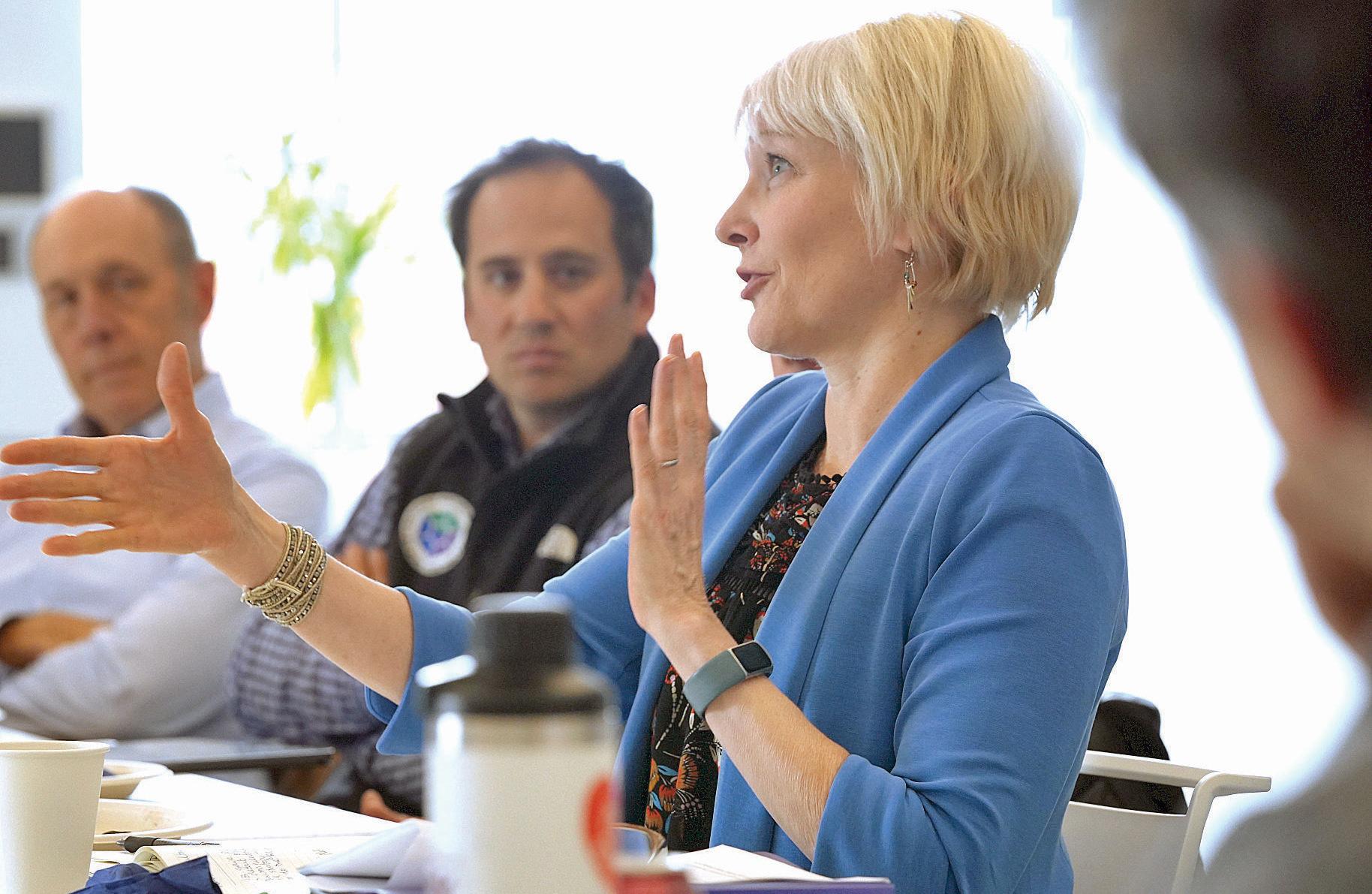

I’ve long argued that Western Massachusetts is well-positioned to become a hub for domestic, clean technology manufacturing. This vision — pushed by the Berkshire Innovation Center (BIC) and a coordinated group of local and regional partners — was bolstered last month by a major accolade: the U.S. Department of Energy’s Phase III “MAKE IT” Activate Award.
Awarded through the DOE’s Manufacture of Advanced Key Energy Infrastructure Technologies program, the MAKE IT Prize is part of a strategic push to strengthen America’s clean energy supply chains and manufacturing capabilities. The competition played out in three phases.
We were the only Massachusetts community selected as a Phase I awardee last fall and the only community in New England selected as a Phase II awardee this past spring. Just before the holidays, we were announced as one of five winners in the final round of the competition — Phase III — joining notable projects in Chicago, Rochester, Cleveland and Tulsa. The competition involved aligning a wide range of partners and building a regional roadmap to support and cluster clean technology manufacturing. It was a highly competitive process that helped us form a clear vision and strong coalition.
The vision was built in coordination with the commonwealth of Massachusetts, which has made climate tech a key pillar in its economic development strategy. The state’s efforts are led by the Massachusetts Clean Energy Center whose CEO, Emily Reichert, visited recently.
In highlighting the region’s potential, she noted that “Western Massachusetts has preexisting manufacturing infrastructure, a burgeoning cluster of climatetech companies, and the ‘connective tissue’ of the BIC to bring it all together.”
Our roadmap builds on the region’s industrial heritage and natural strengths — affordable land, a skilled workforce, and proximity to research institutions like UMass Amherst, RPI, WPI, and MIT. The state’s recently signed Mass Leads Act, which includes a nearly $1 billion investment in climate tech innovation and manufacturing, accelerates the opportunity.
works. Growing climate tech firms in Western Massachusetts — such as Sublime Systems, Clean Crop Technologies, Noble Carbon, IdleSmart, and SolaBlock — demonstrate the region’s potential and the capabilities.
At the heart of it all is the BIC as a regional hub. Since we opened our doors, we have worked with industry, academic and governmental partners to provide access to shared labs and technology, workforce development initiatives, and programs for entrepreneurs. Key programs include:
• The BIC Manufacturing Academy: Developed in partnership with MIT, this program is designed to support the growth and development of the future leaders of regional firms.
Key to the effort is attracting and supporting startups, which often face challenges transitioning from research to commercialization.
Key to the effort is attracting and supporting startups, which often face challenges transitioning from research to commercialization. The BIC’s ecosystem provides essential resources, including advanced prototyping labs, mentorship, and access to industry net-
• The Stage 2 Accelerator Program: A 35-week, handson program designed to serve early-stage tech startups that are building a physical product and moving toward the manufacturing phase.
• Future Innovators Summer Program: An intensive experiential learning program designed to connect high school students with local businesses and engage in technologies offered at the BIC.
A NETWORK OF COLLABORATION
The success of the roadmap

relies on the collaboration of ecosystem partners. This includes quasi-governmental entities such as the Mass Clean Energy Center, the Mass Tech Collaborative, and MassDevelopment; statewide entrepreneur support organizations such as Forge, Greentown Labs, and the Engine; major research institutions such as MIT, UMass Amherst, and RPI; and local economic development partners such as 1Berkshire, Berkshire Regional Planning Commission, the Pittsfield Economic Development Authority, and the Berkshire Black Economic Council.
These partnerships are not just on paper. We have built meaningful bonds and a web of connectivity. Growing companies need a range of support and expertise, and the pathways we have laid are critical, particularly for firms looking
to prototype, pilot and scale their technologies.
MASSACHUSETTS LEADERSHIP MORE CRITICAL THAN EVER
The MAKE IT award signifies more than recognition — it’s a launchpad for Western Mass to play a leading role in what Gov. Maura Healey describes as Massachusetts “Clean Tech Corridor.” With policy changes at the Federal level, leadership at the state level — and involvement from all corners of the Commonwealth — is more important than ever.
There has been historic private sector investment in clean energy transition and the clean energy manufacturing supply chain, and growing firms need communities that are prepared and eager to partner. We are open for business.
Berkshire County Real Estate Transactions for Dec. 2-Jan. 3
ADAMS
Colleen A. Doyle sold property at 58 Valley St., Adams, to Danielle Wiencek, $275,000.
Robert F., Alan, Mark, and Craig Neveu sold property at 4 Mountain View Drive, Adams, to Daniel Sadtler, $375,000.
Heather C. and Keith E. Bourassa Jr. sold property at 93 East Hoosac St., Adams, to William E. Kennedy, $290,445.
Interstate Investment Group LLC sold property at 110 Columbia St., Adams, to Fieldston Properties LLC, $250,000.
Peter R. West sold property at 14 Richmond Lane, Adams, to Fieldston Properties LLC, $250,000.
Mark D. Ziaja, individually and as personal rep. of Joanne L. Ziaja, and Marianne Z. McGreal sold property at 139 Bellevue Ave., Adams, to Roger Gephart, $245,000.
Robert J. Tomkiewicz sold property at 49-51 Bellevue Ave., Adams, to Mario A. Spezzaferro and Kathleen A. Sadzinski, $205,000.
Sandra Hajdas Moderski, trustee of the Sandra Hajdas Moderski RVT, sold property at 40 East Jordan St., Adams, to Jason Nocher, $258,000.
Rebecca A. Michalski, personal rep. of Frances Louise Eichorn, sold property at 51 Leonard St., Adams, to Dalton P. Martinelli, $190,000.
Greg LeBeau and Erika Snyder sold property at 5 Daniels Court, Adams, to Natasha P. and Christopher J. Martin, $390,000.
David F. and Mark J. Stavaski sold property at 20 Siara St., Adams, to James B. Wheeler, $225,000.
Anthony M. Booth Sr. sold property at 9 Richmond Lane, Adams, to Kayla Cerveira, $240,000.
Nicholas F. Penna sold property at 74 Lime St., Adams, to Jacob Lacoco, $199,900.
Michael Merriman, trustee of Joe Edwards Trust, sold property at 144 Green River Road, Alford, to Noah Meyerowitz, $635,000.
Cloud Kingdom 2020 LLC sold property at 274 East Road and 0 East Road, Alford, to Timothy J. Scholler and David L. Press, $895,000.
Gregory Schneider and Cynthia Schneider sold property at 27 White Hill Road, Alford and Egremont, to Jessica S. Curtis and Todd A. Curtis, $462,500.
Daniel E. Aks and Michaelanne C. Discepolo sold property at 30 North Egremont Road, Alford, to Robert Rominger and Eileen Rominger, $1,000,000.
William J. Ryan, trustee of Ryan Opper Realty Trust of 2021, sold property at 297 East Road, Alford, to Jonathan M. Perloe and Malaine R. Miller, $890,000.
Matthew Prendergast, personal rep. of the Estate of Patrick Jude Prendergast, sold property at 2226 Main St., Becket, to Raymond Chapman, $289,000.
James Hertz and Bronwyn Jean Casey sold property at 41 North Lake Way, Becket, to Huckleberry Hideaway LLC, $835,000.
Leon West Jr. and Donna M. Housand sold property at Moberg Road, Becket, to Emilio Antonio Gonzalez, $30,000.
Federal National Mortgage Association sold property at 23 Algerie Road, Becket, to Patricia Eckert and Seth Bartosik, $355,000.
Ashley M. Adams sold property at 28 Andrews Road, Becket, to Ethan Kennelly and Erin Hartwiger, $347,000.
Kyle and Dawn E. Ford sold property at Leonhardt Road, Becket, to Berkshire Contractor LLC, $60,000.
Donald Lee Murray sold property at 1088 Chester Road, Becket, to Venth Sophat and Janjira Thyda Sun, $100,000.
CHESHIRE
Town of Cheshire sold property at 1666 Wells Road, Cheshire, to Corey M. Warner, $74,000.
Andrew J. and Kerry A. MacRonald sold property at 652 Notch Road, Cheshire, to Devon M. and Sydney Whalen, $385,000.
Carol F. Bratcher sold property at 36 School St., Cheshire, to Corey M. Warner, $89,900.
Secretary of Housing and Urban Development sold property at 149 Wilshire Drive, Cheshire, to Ellies Holdings LLC, $224,700.

Aero Wave LLC sold property at 6 Arnold Court, Cheshire, to Heather Lynne Disanti, $230,500.
CLARKSBURG
Caleb B. Miner sold property at 251 West Road, Clarksburg, to Jacob J. Cairns, $670,000.
Valeri A. Reynolds sold property at 130 Raymond Drive, Dalton, to Brett and Katelyn Matthews, $875,000.
Russell H. and Jacquelynn K. Varney sold property at 265 East St., Dalton, to John Paul Kozak II, $401,000.
Michael H. White sold property at 181 Park Ave., Dalton, to Cory Evangelisto, $150,000.
Robert A. Lezberg and Jennifer B. Greenfeld sold property at 45 Washington Mountain Road, Dalton, to Scott L. and Glenda L. Garland, $125,000.
Mary I. Haddad, trustee, Mary I. Haddad Revocable Trust, sold property at 182 Sleepy Hollow Drive, Dalton, to Lise Dahuron, $650,000.
Christopher J. Duquette and Jacqueline M. McLaughlin, personal reps. of the Estate of Mary Jane Duquette, sold property at 15 Pine St., Dalton, to Sean and Roxanne Stever, $285,000. Frank and Nathan Rudd, Claire Townend, Wendy and Bruce Miller, Darcie Sosa, Nicole and Heather Papirio sold property at 190 Ashuelot St., Dalton, to Frank Rudd and Claire Townend, $195,000.
Steven W. Fellmann sold property at 630 North St., Dalton, to Patrick Carnute and Ashley Goodness, $300,000.
Jonathan and Andrea Sutherland sold property at 450 Hinsdale Road, Dalton, to Paul and Laura Mikolaitis, $327,500.
Michael F. and Christie A. Morrissey sold property at 44 Pine St., Dalton, to Melyssa Weiner, $289,900.
Raymond A. and Mona M. Guidi sold property at 193 Curtis Ave., Dalton, to Victor Hugo Zuluaga Ramirez, $250,000.
Central Berkshire Habitat for Humanity Inc. sold property at 16 Gulf Road, Dalton, to Stephanie Hernandez and Ricardo Oliver Santillan Garcia, $225,000.
Kenneth and Brian M. Russell and Kristin D. Bynum sold property at 18 Sunnyside Drive, Dalton, to Ann M. Farrell, $260,000.
EGREMONT
Derek D. Sanders and Michelle Kessler-Sanders sold property at 92 Jug End Road, Egremont, to Jug End Road LLC, $1,400,000.
Carousel Phoenix LLC sold property at 302 Egremont Plain Road, Egremont, to Leslie Mintzer and Mark Baum, $550,000.
Kenneth J. Dyer and Susan E. Dyer sold property
at 65 Baldwin Hill Road, Egremont, to David Masterman and Marie Margolius, $1,385,000.
Courtney Kulik Wanosky, trustee of F.K. Nominee Realty Trust, sold property at 12 Mearns Way, Egremont, to Thomas Gray and Jodie A. Abbatangelo, $535,000.
Peter E. Steiner sold property at 58 Main St.,
Egremont, to Sarah M. Defalco, $30,000.
GREAT BARRINGTON
Sam M. LaCroix, Lauren E. Shor and Charles E. Loeser sold property at 6 Berkshire Circle, Great Barrington, to Eric Dyer and Brooke Buzzerd Dyer, $660,000. SIRI
TRANSACTIONS, Page 20





James Hendrick sold property at 281 Main St., Unit 6B, Southworth Condominium, Great Barrington, to Robert Tutnauer, $381,500.
H. Otis Pond III sold property at 360 Park Street North, Unit 1, Beehive Condominium, Great Barrington, to Richard J. Bourdon, $230,000.
Hosea Frank and Jody Brandt sold property at 89 Division St., Great Barrington, to Donald S. Dickson Jr. and Jennifer B. Pennington, $915,000.
Stephen A. Gabriel and Anne Marie Fogarty, trustees of ARG Living Trust, sold property at 4 Depot St., Great Barrington, to 4 Depot Street LLC, $394,000.
Diane L. Pate sold property at 10 Stanley Drive, Unit A-5, Blue Hill Commons Condominium West, Great Barrington, to Patrick Cain Sargent and Monica Ann Haver, $397,000.
William Grossman and Melanie D. Grossman, trustees of William Grossman and Melanie D. Grossman 2001 Trust, sold property at Hurlburt Road, Great Barrington, to Banana Canyon LLC, $215,000.
Mark A. Pruhenski and Melissa A. Vansant sold property at 168 Taconic Ave., Great Barrington, to Leanne Will and Andrew Will, $605,000.
Bruce McCarter and Kim Kaufman sold property at 2 Ramsey Ave., Great Barrington, to Laird C. Townsend and Heidi E. Roots, $400,000.
Mary Kate McTeigue sold property at 53 River St., Great Barrington, to Benjamin Strassfeld and Joanna Barlow, $595,000.
Studio One LLC sold property at 410 Park St., Great Barrington, to Berkshire Pulse Inc., $3,970,000.
Christopher R. Thomas sold property at 28 Manville St., Great Barrington, to Lauren Driscoll and Bryan Cerenzio, $550,000.
Peter J. Most and Anne Zapoleon Most, trustees of Most Family Trust, sold property at 21 East Mountain Road, Great Barrington, to James Noble and Deborah Noble, $215,000.
George Ramirez sold property at 44 Blue Hill Road, Great Barrington, to Berkshire Natural Resource Council Inc., $600,000.
James P. Troiano, trustee of Peter Troiano 2001 Family Trust, sold property at 390 North Plain Road, Great Barrington, to Evan C. Troiano, $420,000. Annie Okerstrom-Lang and Craig Okerstrom-Lang sold property at 80 Taconic Ave., Unit 8, Oakwood Inn Condominiums, Great Barrington, to Taconic Ryan LLC, $647,000.
19 Gilmore Avenue LLC sold property at 19 Gilmore Ave., Great Barrington, to Beth Liebowitz, $643,000.
Thomas A. Cappaert and Kimberly A. Munroe sold property at 0 North Plain Road, Great Barrington, to Gift Fund VI LLC, $25,000.
Mujahid Ishaqsait sold property at 333 Long Pond Road, Great Barrington, to Melissa B. Mazor and Daniel J. David, $1,000,000.
HANCOCK
Lorayne C. Fiorillo sold property at 37 Corey Road, Unit 428, Hancock, to Howard Greenspan, $137,500.
Steven M. and Louise J. Venokur sold property at 37 Corey Road, Unit 72, Hancock, to Howard Greenspan, $250,000.
Steven L. Messick and Carol Tuckerman, trustees of the Redhills-TM Trust, sold property at 37 Corey Road, Unit 433, Hancock, to Howard Greenspan, $137,500.
Robert A. Flanagan and Diane M. Ryan sold property at 37 Corey Road, Hancock, to Lisa Strack, $138,000.
HINSDALE
Lenore Development Corporation sold property at 76 Lenore Drive, Hinsdale, to Brian Christopher and Margaret
Dana Eseppi, $86,000.
Midfirst Bank sold property at 103 Holmes Road, Hinsdale, to Kevin Stacey, $175,000.
Donna Martin, personal rep. of the Estate of Tina Martin, and Donna and Michelle M. Martin, and Laurie L. Moselsky sold property at 111 Peru Road, Hinsdale, to LND Investments LLC, $45,000.
LANESBOROUGH
Amy D. Fisher sold property at 4 Leslie Ave., Lanesborough, to Joseph E. Pizani, $285,000.
Brent A. and Lynne Baumgartner sold property at Silver Street, Lanesborough, to Douglas N. Smith Jr., $10,000.
Jeffrey W. and Roberta N. Packer sold property at 0 and 1040 North Main St., Lanesborough, to Sanford Malcolm and Karen Ann Silverman, $530,000.
Carmen J. Bourgeois sold property at 41 Old Main Road, Lanesborough, to James Travers O’Donnell, $340,000.
LEE
Patrick J. and Annmarie Holian sold property at 10 Mountain View Terrace, Lee, to Joshua C. and Sarah M. Tracy, $415,000.
Robert V. Failla sold property at 65 St. James Ave., Lee, to Nicholas and Katelyn C. Delgrande, $370,000.
Brendan and Carrie Swift Heck sold property at 320 Laurel St., Lee, to Candice Frost, $417,500.
Angelo Gelpi sold property at 204 Center St., Lee, to Leydet Properties LLC, $130,000.
Merritt Home Solutions LLC sold property at 21 Tabar Ave., Lee, to Diane L. Pate, $305,000.
Laura T. Lembo sold property at 175177 Laurel St., Lee, to Josue and Beatriz Colon, $540,000.
Heather L. Messer, personal rep. of the Estate of Robert Gerald Messer, sold property at 36 Olive St., Lee, to Matthew R. Cuevas, $180,000.
Berkshire Bradley LLC sold property at 271 Bradley St., Lee, to Stephanie Bennet, $270,000.
Marines Fatima Dos Reis sold property at 198 Washington Mountain Road, Lee, to Dean Parise Jr. and Emma Haskell, $331,000.
LENOX
Susan L. Martino sold property at 18 Meadow Lane, Lenox, to Joanne L. Heaton, trustee, Joanne L. Heaton 2024 FT, $317,000.
Gateways Inn Properties LLC sold property at 59 Walker St., Lenox, to James M. and Judith Spates, $610,000.
Gregg D. Rennie, personal rep. of the Estate of Francis J. Vahle Sr., sold property at 83 West Mountain Road, Lenox, to William A. Vahle, $360,000.
Neil and Elizabeth Hirsch sold property at 1 Melville Court, Lenox, to Matthew and Kathryn Dewolf, $1,100,000.
Stephen Giroux, trustee, Patterson/ Jordan Trust, sold property at 528 Walker St., Lenox, to Evergrain Orchard LLC, $40,000.
Karen G. Kaufman, trustee, Karen Kaufman Trust, sold property at 1 Morgan Manor, Lenox, to Emily Anne Catalini, $292,000.
Hope A. Hagler sold property at 56 Plunkett St., Lenox, to Stephen Ephraim Maizlish and Joyce Susan Goldberg, $635,000.
Joseph B. Gold, personal rep. of the Estate of Barbara A. Gold, sold property at 10 Sargent Brook Road, Lenox, to Bernd Schoner and Morwaread Mary Farbood, $1,200,000.
Robin Elise Fleet sold property at 610 East St., Lenox, to Daniel J. and Annette McIntyre, $915,000.
Denis Kudriashov and Paula K. Fields sold property at 260 Pittsfield Road, Lenox, to Marie Paradise, $230,000.
6 Jennifer Street LLC sold property at 6 Jennifer St., Lenox, to John Steele, $360,000.
Avi Laub and Miri Laub Goldman sold property at 260 Pittsfield Road, Lenox,
to Emmett Burnham-Lemaire, 155,000. Blantyre LLC sold property at 16 Blantyre Road, 38 Patterson Road and Patterson Road, Lenox, to Blantyre Property Company LLC, $14,000,000. Howard L. and Shirley A. Shapiro, trustees, Howard L. Shapiro RVT, and Howard L. and Shirley A. Shapiro, trustees, Shirley A. Shapiro RVT, sold property at 361 East St., Lenox, to Jennifer Gardiner and Elizabeth Roche, $615,000.
Mary P. Harbaugh, personal rep. of the Estate of John V. Lason, sold property at 260 Pittsfield Road, Lenox, to Michael E. Meehan, $179,000.
MONTEREY
Karen J. Allen sold property at 17 Cronk Road, Monterey, to Sarah A. Keeyes, trustee of Sarah A. Lesley Family Trust, $2,150,000.
Caleb G. Roepe and Cindy Ashmore sold property at Broderick Road, Monterey, to Horse Haven LLC, $40,000.
MOUNT WASHINGTON
Leonard Salamon and Dianne Salamon sold property at 0 East St., Mount Washington, to Galvydas Kuncas and Amber Patricia Rose Sprague, $202,000.
NEW MARLBOROUGH
Bruce L. Pretty and Rita M. Schumacher sold property at 20 Brewer Hill Road, New Marlborough, to Niav Connor and Thor T. Wallace, $1,100,000.
Berkshire Property Rentals LLC sold property at 1976 Clayton Mill River Road, New Marlborough, to Bruce L. Pretty and Rita M. Schumacher, $912,000.
Bruno A. Quinson and Mary Ann Quinson sold property at 0 Norfolk Road, New Marlborough, to Jeffery E. MacGregor and Judith A. Newman, $300,000.
Thomas M. O’Connor sold property at 174 Campbell Falls Road, New Marlborough, to Anna Weesner, $1,275,000.
NORTH ADAMS
Brett A. and Tania L. Goodermote sold property at 23-25 Brooklyn St., North Adams, to Bernadette D’Errico, $212,900.
Tobe A. Cote sold property at 300 Church St., North Adams, to Brittany-Ann Goodermote, $199,000.
Bank of New York Mellon as trustee sold property at 11 Greene Ave., North Adams, to Ellies Holdings LLC, $126,000.
Walgreen Easter Co. Inc. sold property at 50 Lincoln St., North Adams, to Colvest/North Adams LLC, $1,275,000.
David Lemaire sold property at 458 West Main St., North Adams, to Brian Sayers, $139,000.
Tyler Carroll sold property at 442 Notch Road, North Adams, to Alicia O. Bond and Larry M. Bond Jr., $398,000.
Jacques Wajsfelner sold property at 227 Franklin St., North Adams, to RSI North Adams LLC, $5,200,000.
Jason McCausland sold property at 28 Washington Ave., North Adams, to Big Name Investments LLC, $100,000.
Sara J. Keane sold property at 12-14 Estes St., North Adams, to AKCMAPAC LLC, $165,000.
OTIS
Frank P. Rondoletto sold property at North Blandford Road, Otis, to Orlando Jr. and Nadine M. Huertas, $170,000.
Rafael Bones sold property at 139 High Rise Road, Otis, to Dylan Jacobus, $215,000.
Karl and Paula Subklew sold property at 250 Stebbins Road, Otis, to Jan Poklad, $87,000.
CEL LLC sold property at 411 East Otis Road, Otis, to Nicholas Chaffee, $49,000.
John Wilson sold property at New Hollywood Boulevard, Otis, to Robert C. Fedor, $32,000.
Kathy M. Coppola, personal rep. of the Estate of Frances W. Akoury, sold property at 22 Oak Lane, Otis, to David R. Stevens, $700,000.
Diane M. DiCarlo sold property at Algerie Road, Otis, to Barry T. and Sandra P. Donahoe, $29,500.
PERU
Susan A. Malone, Katharine A. MaloneSmith and Clinton Smith sold property at 20 Haskell Road, Peru, to Brian Kopinto, trustee, 20 Haskell Road Land Trust, $227,500.
PITTSFIELD
Lorraine M. Sciola sold property at 42 Joseph Drive, Pittsfield, to Kristen Dominguez, $341,500.
Michael R. Ryan, trustee, Robert G. Ryan 1999 RVT, and Michael R., Mark R. and Christopher J. Ryan, sold property at 5 Jeffrey Drive, Pittsfield, to Michael R. Ryan and Sarah C. Richards, $305,000.
Jonathan M. and Carrie R. Hornbeck sold property at 84 Brookside Drive, Pittsfield, to David A. and Inge Spungen, $702,000.
Joshua C. and Sarah M. Tracy sold property at 815 Williams St., Pittsfield, to Ryan M. and Kimberly W. Boya, $395,000.
Kaitlyn B. and Maribel Giron sold property at 180 Partridge Road, Pittsfield, to Paul and Catherine Perry, $350,000.
Catherine R. and Paul J. Perry sold property at 9 Cole Ave., Pittsfield, to Francis and Stephanie Crowley, $305,000.
Kristin J. Crawford sold property at 95 Asci Drive, Pittsfield, to Clarinda M. Gillyard, $335,900.
Suzanne S. Chung sold property at 54 Alpine Trail, Pittsfield, to Rachel Hoffman, $650,000.
Barbara Lagergren, Sharon Cronin and John Donovan sold property at 46 Alfred Drive, Pittsfield, to Nicholas C. and Chelsea H. Avola, $404,800.
John J. Lacey and Edward B. Greenleaf sold property at 7 Holt St., Pittsfield, to Thomas Garlington, $638,500.
Edward J. LaDouceur Jr. and Constance A. LaDouceur sold property at 12441246 East St., Pittsfield, to Gianokakis LLC, $175,000.
James J. Geary sold property at Hancock Road, Pittsfield, to John Lacey and Angela Elzner, $70,000.
Jeffrey M. Holden sold property at 95 Cheshire Road, Pittsfield, to John F. Fay, $250,000.
Sydney D. Whalen sold property at 282 Connecticut Ave., Pittsfield, to Kevin Carbone, $305,000.
William A. O’Bryan, trustee, William A. O’Bryan RVT, sold property at 26 Davis St., Pittsfield, to Bartlett Yard Care LLC, $90,000.
Matthew E. and Lesley C. Herzberg sold property at 25 Revere Parkway, Pittsfield, to Daniel Getz, $435,000.
Joanne D. Parsons sold property at 2 Monteleone Place and 139 Second St., Pittsfield, to Hurricane Properties LLC, $417,200.
Tarkan Topcuoglu sold property at 4143 Perrine Ave., Pittsfield, to Odair Silva Felisberto, $375,000.
Winthrop D. Kie Jr., trustee, Winthrop D. Kie Jr. RVT, sold property at 29 Jones Ave., Pittsfield, to Raul Humberto and Ana M. Villalobos, $261,000.
David G. and Joanne D. Parsons sold property at Second Street, Pittsfield, to Hurricane Properties LLC, $2,800.
Thomas Pecoraro sold property at Grove Street, Pittsfield, to David Gabriel de Sousa, $15,000.
Mark Bassett, personal rep. of the Estate of Rita Mary Bassett, sold property at 86 Nancy Ave., Pittsfield, to Jacqueline A. Leibinger, $300,000.
Patrick J. and Melissa M. Carhart sold property at 50 Cleveland St., Pittsfield, to David K. and Mary Ann Hollenbaugh, $325,000.
Robert S. Sams and Susan H. Coyne sold property at 444 Barker Road, Pittsfield, to Harland L. Miller III and Angela T. Miller, $508,723.
Jamie A. and Laura A. Delmolino sold property at 14 Richard Drive, Pittsfield, to Javier Claudio Fernandez and Alicia M. Mamani, $395,000.
Michael R. Connors, personal rep. of the Estate of Scott Patrick Connors, sold property at 329 Connecticut Ave., Pittsfield, to Sandra E. Cornejo, $235,000. Christa Ames sold property at 181 Woodlawn Ave., Pittsfield, to 555 East Street Realty LLC, $80,000.
Marilyn J. Coussoule and James P. McCauley sold property at 12 Scammell Ave., Pittsfield, to Ericka Flores, $70,000.
Scott R. and Isabel M. Lenihan sold property at 269 Mountain Drive, Pittsfield, to Darren Swan and Katherine C. DeMarco, $878,000.
Warren M. and Selma L. Shimmerlik, trustees, Warren and Selma Shimmerlik Joint Living Trust, sold property at 29 Aspen Way, Pittsfield, to Kathleen M. Connor, trustee of Kathleen M. Connor Living Trust, $672,500.
Douglas N. Smith Jr. sold property at Jeebe Street, Pittsfield, to Jason LaBelle, $1,000.
Massachusetts Department of Transportation sold property at Peck’s Road, Pittsfield, to Roman Catholic Bishop of Springfield, $205,000.
Troy K. Laureyns sold property at 605 East St., Pittsfield, to Amy Avila, $185,000.
Ricky J. Derby and Sandra Fong-Ging sold property at 44 Pine St., Pittsfield, to Ryan Saul and Kierstyn Defer, $278,500.
P.A.P Realty Company sold property at 428 Merrill Road, Pittsfield, to Pittsfield Massachusetts Storage LLC, $1,800,000.
Robert P. and Barbara Lee Sorbara sold property at 9 Appletree Point, Pittsfield, to Diedra Cecily Shull, trustee, Diedra Cecily Shull GST Exempt Trust, $1,930,000.
Patricia A. Behan sold property at 24 Bernard Ave., Pittsfield, to Jacob and Laken Mary Rand, $273,000.
Lakeview Loan Servicing LLC sold property at 252 Wahconah St., Pittsfield, to Sergio Albano Basilio, Maria Jordelina Viana and Junio Paulo Silveira, $81,000.
Nicholas J. Evans, personal rep. of the Estate of Robert Bruce Evans, sold property at 19 Upland Road, Pittsfield, to Jameel J. Winters, $211,000.
Leydet Properties LLC sold property at 37-39 Hazelwood Terrace, Pittsfield, to Ilana Barker, $365,000.
Massachusetts Housing Finance Agency sold property at 88 Lyman St., Pittsfield, to Tara K. Carter and Max B. Bohan, $164,500.
Albindian Realty LLC sold property at 228 Francis Ave., Pittsfield, to 228 Francis Management LLC, $253,225. Scott J. and Karen A. Bailey sold property at 20 McArthur St., Pittsfield, to Thomas Robert and Caitlyn Marie Allen, $254,000.
Terry A. Bishop Sr. and Rosemarie A. Bishop sold property at 28 Highland Ave., Pittsfield, to Anne Fresia, $269,900.
Donna L. Guidi sold property at 144 Stearns Ave., Pittsfield, to Peter B. and Dawn M. Taylor, $160,000. Cavalier Holdings LLC sold property at 54-56 Worthington St., Pittsfield, to Marco Antonio Sierra Pacheco, $250,000.
Jeffrey P. and Katherine N. Lyon sold property at 32 Worthington St., Pittsfield, to Billie Margheim and Jason Marvin, $251,000.
Trevor V. Williams sold property at 52 New York Ave., Pittsfield, to Deborah M. Furst, $285,000.
Charlene M. Giovanetti, Kathryn A. Kirchner, Martin J. Yansak, Steven J. Yansak Sr., and Paul E. Yansak sold property at 93 John St., Pittsfield, to Thomas and Charlene M. Giovanetti, $175,010.
Marie A. Paradise sold property at 54 Joseph Drive, Pittsfield, to David T. and Kathy Jo Harmon, $399,900. Mandala Holdings LLC, trustee, Mandala Holdings Irrevocable Trust, sold property at 51 Seymour St., Pittsfield, to Justin and Devin McCassie, $316,000.
Margaret Bott sold property at 1450 North St., Pittsfield, to Donald J. Laferriere, $362,500.
Katherine C. DeMarco and Darren Swan sold property at 139 Mountain Drive, Pittsfield, to Nicolas A. Gurley, $555,000.
Raymond E. and Margaret M. Risley sold property at 28-30 Adam St., Pittsfield, to Raymond Grandchamp, $98,000.
Jason P. Choon sold property at 169-171 Brown St., Pittsfield, to Ivy Osei-Mensah and Joseph Armah, $265,000.
Jhon Prey Hernandez Melchor and Nancy Eucaris Gomez Ramirez sold property at 81-83 Wellington Ave., Pittsfield, to Licentia Properties LLC, $190,000.
James Robert Kelley Jr., personal rep. of the Estate of Patricia Carol Kelley, sold property at 248 Lebanon Ave., Pittsfield, to Amy P. Coole and Jared M. Gilpatrick, $295,000.
Pablo Xicotencatl Leon sold property at 176 Robbins Ave., Pittsfield, to Carlos Chavez Osorio and Shiara Quispe Seminario, $282,000.
Krystal M. Conrado, Anthony and Lisa-Jo Bolognia sold property at 99 Westchester Ave., Pittsfield, to Ligia Veronica Perez Barona, $200,000.
Chad N. and Morgan T. Civello sold property at 46 Baldwin Ave., Pittsfield, to Douglas Nils and Gale Ruth Cederberg, $363,000.
Lynn K. Murphy sold property at 51 Anita Drive, Pittsfield, to William Raleigh, $276,000.
Marc F. Zamboni sold property at 560 South St., Pittsfield, to Carrie Ramirez, $410,000.
James P. McCauley sold property at 42 Brown St., Pittsfield, to 555 East Street Realty LLC, $120,000.
Holly Parrott sold property at 27 Joan Drive, Pittsfield, to Raymond L. Parrot Jr. and Jennifer L. Parrott, $150,000.
John J. Martin Jr., trustee, Second Restated John R. Gobel Trust-2009, sold property at 121 Wendell Ave., Pittsfield, to Ryan Wadsworth, trustee, 121 Wendell RT, $289,000.
BHO Realty LLC sold property at 815 East New Lenox Road, Pittsfield, to Erick and Alejandro Bartlett, $325,000.
Victor S. Ruiz sold property at 101 Cromwell Ave., Pittsfield, to Jamie E. Downer and Eli R. King, $294,175.
Anthony P. Doyle, commissioner, Tatiana Saunders and Tatiana Saunders, personal rep. of the Estate of Steven S. Nikitas, sold property at 41 Stonehenge Road, Pittsfield, to Dominic A. and Katharine A. Cimini, $536,000.
RICHMOND
Maureen Ridge sold property at 129 Shore Road, Richmond, to Timothy and Allison Kearns, $295,000.
Town of Richmond sold property at 1529 State Road, Richmond, to Richmond Technology LLC, $42,000.
SANDISFIELD
Joshua N. Beer and Adam B. Beer, trustees of Beeramar Realty Trust, sold property at 381 Deer Run, Sandisfield, to David L. Goldman and Hnin Khine, trustees of Goldman Living Trust, $689,500.
David P. Etzel sold property at Cold Spring Road, Sandisfield, to Commonwealth of Massachusetts Department of Conservation & Recreation, $75,000.
SAVOY
Alexandria O. Henderson and Corey J. Blanchette sold property at 167 Loop Road, Savoy, to Brett A. and Tania L. Goodermote, $330,000.
Brian W. and Stephanie B. Sayers sold property at 74 Old Main Road, Savoy, to Abigail Grey, $285,000.
Mark W. Bigarel and Melissa Bigarel sold property at 815 South Undermountain Road, Sheffield, to Philip Levy and Ellyn Levy, $849,000.
Grace Mendel and Bridget Lee, co-trustees of Hound Dog Revocable Trust, sold property at 281 Silver St., Sheffield, to James Horton and Jaclyn L. Skurie, $385,000.
Theresa M. Collingwood sold property at 773 Clayton Road, Sheffield, to Benjamin F. Gomez Marcos and Maritza I. Atehortua Leon, $400,000.
Karen A. Faul, Shannon McAuliffe, David Faul, John Faul, and Richard Faul sold property at 550 Sheffield Plain, Sheffield, to Zachary Rousou and Karina Rousou, $650,000.
Curtis G. Rand and Susan S. Rand sold property at Cooper Hill Road, Sheffield, to The Trustees of Reservations, $1,200,000.
Marcia E. Brolli, trustee of Brolli Living Trust, sold property at 345 Miller Ave., Sheffield, to Berkshire School Inc., $569,500.
Guenther Stockfisch and Laura Stockfisch sold property at 377 South Main St., Sheffield, to Walter Hewins IV and Kendra Hewins, $360,000.
Race Brook House LP sold property at 896 South Undermountain Road, Sheffield, to Saadia Shaza Khan, $150,000.
Frank A. Cipollino Sr., trustee of FAC
I Realty Trust, sold property at 703 North Main St., Sheffield, to LANMARC LLC, $520,000.
STOCKBRIDGE
John J. Martin Jr., trustee of the Decedent’s Trust established under the Lippmann Family RVT, and trustee of Survivor’s Trust established under the Lippmann Family RVT, sold property at 2 Cherry St., Stockbridge, to Chauncey and Elizabeth Collins, $1,200,000.
Michael Praver, trustee, Lenox Apartment Trust, sold property at 19 Hawthorne Road, Stockbridge, to Mark
and Ellen Levine, $660,000.
Ariel Hyatt, trustee, S. Gordon Hyatt RVT, sold property at 82 East Main St., Stockbridge, to Scott Malish and Emily Dindial, $1,350,000.
WASHINGTON
Town of Washington sold property at Cherry Road, Sunset Road, Maple Road, Westerly Road, Hillside Drive, Overhill Road, Birch Road, Elm Road, Washington, to The Nature Conservancy, $25,100.
Stephen and Dolores Wallin sold property at 129 Upper Valley Road, Washington, to Daniela S. Blaschke, $500,000.
Amanda L. Raymond sold property at 54 Schulze Road, Washington, to Tucker Beers, $234,900.
WEST STOCKBRIDGE
Richard J. Brophy Jr., Cheryl A. Reynolds, Raymond J. Brophy, and Melanie A. Graf sold property at 27 Swamp Road, West Stockbridge, to Robert Koch and Kimberley E. Koch, $375,000.
Stephen Glick sold property at 258 Great Barrington Road, West Stockbridge, to David Ott and Isabelle Foster, $1,070,000.
Alan English and Janice Rowley sold property at 20 State Line Road, West Stockbridge, to Barbara J. Churchill, $559,000.
WILLIAMSTOWN
Samuel W. and Elizabeth V. Smith sold property at 1216 Hancock Road, Williamstown, to Bridget M. Spann and Donald M. Zasada, $210,331.16.
160 Water LLC sold property at 160 Water St., Unit 25, Williamstown, to Jacqueline A. Galusha, $650,000.
Adam David Digennaro and Brittany Christine Reeves sold property at 220 Henderson Road, Williamstown, to Henderson Hill LLC, $287,500.
Felicia F. Coalson, trustee of the Van
Uitert Irrevocable Tennessee Investment Services Trust Agreement, sold property at 70 Stoney Ledge Road, Williamstown, to Laurence H. and Daphne P.B. Birdsey, $1,325,000.
Legend Interests Inc. sold property at 139 Water St., Williamstown, to John H. Robinson, $140,000.
Erin G. Wright sold property at 660 Main St., Williamstown, to Massey Real Estate LLC, $300,000.
Judith A. Alden, trustee of the Alden NT, sold property at 1072 North Hoosac Road, Williamstown, to Robert S. Slifkin and Amanda T. Durant, $342,900.
Berkshire Properties Inc. sold property at Henderson Road, Williamstown, to Gerald J. Smith, $5,000.
160 Water LLC sold property at 160 Water St., Unit 311, Williamstown, to Barbara Greco and Andrew S. Potash, $375,000.
Kenneth W., Jennifer D. and Arthur R. Needham II sold property at 221 Peru Road, Windsor, to Tracy D. and Arthur R. Needham II, $150,000.
Jackie L. Wood sold property at 331 Shaw Road, Windsor to John and Leann Fitzgerald, $17,000.
Ricky J. Barnes sold property at 130 High Street Hill Road, Windsor, to Jonathan and Andrea Sutherland, $460,000.








The real estate transactions are provided by the Middle Berkshire, North Berkshire and South Berkshire Registry of Deeds offices.

Bethany Prince-Malloy, program director of the Northern Berkshire Family Center, received the Emerging Leader Award from The Children’s Trust in Boston at its annual training conference, “A View from All Sides.”
The Emerging Leader Award recognizes an individual who has worked in parenting education or family support for at least five years. An Emerging Leader excels in their role and goes above and beyond their work responsibilities and has the potential to make a significant impact in the lives of children and families in the future.
Prince-Malloy has been with the Family Center, a program of Child Care of the Berkshires, since 2012. She began as a family support worker, connecting and strengthening families for eight years. She was then promoted to program coordinator and has continued to lead the Family Center team in her current role.
Before her time at the Family Center, Prince-Malloy worked in the domestic violence field. She has specialized training in crisis hotline work and emergency response.
Prince-Malloy earned a bachelor in science degree in social work from Plymouth State University and is a licensed social worker. She also holds a certificate in management and supervision in human services from Boston College.
The Children’s Trust partners with Northern Berkshire County Family Center to support programs that help families thrive. Family Centers are part of the Children’s Trust’s network of programs.

CHP Berkshires has named Carolina Apicella to the position of chief financial officer.
Apicella will oversee financial operations and CHP’s annual $35 million budget. CHP serves 30,000 Berkshire region patients with medical, dental, nutrition, behavioral health and family services support at seven locations countywide.
A certified public accountant, Apicella brings years of financial leadership experience with federally qualified health centers in California and Nebraska. She most recently was CFO at Metro Inclusive Health, an FQHC in St. Petersburg, Fla.
“We’re delighted to welcome Carolina to our leadership team,” said Bethany Kieley, CEO of CHP Berkshires. “In addition to her deep financial management experience, her passion for community health aligns perfectly with CHP’s mission.”
Apicella holds a bachelor’s degree in accounting from the College of Saint Mary in Omaha. Her most recent noteworthy project consisted of her participation and collaboration with California Primary Care Association and CFOs across the state to develop a value-care based reimbursement model.
She is now a resident of Great Barrington.

State Rep. Tricia Farley-Bouvier welcomes Mirabai Dyson as her new Pittsfield-based legislative aide. Dyson graduated from Williams College in June 2024 after majoring in environmental studies.
Dyson brings experience working with elementary and middle schools, homeless communities, Indigenous communities, and Environmental Justice organizations.
“I have much respect for the representative’s work and I am honored to join her staff,” Dyson said of her new role. “My goal is to be of service to the Pittsfield community as best I can. I look forward to learning from and getting to know the community.”
Dyson joined the team following the retirement of Lisa Fletcher-Udel, who served as the Farley-Bouvier’s legislative aide from 2014-2024. Dyson is located at the newly reopened district office, located at 431 North St. in the Framework Coworking space.

Sue Stubbs, president and chief executive officer of ServiceNet, will step down as CEO on Jan. 1, a position she has held for the past 44-plus years.
Bruno Calouro, ServiceNet’s current chief operating officer, will take the helm as CEO.
This transition has been in the works for more than two years, during which time the ServiceNet board of directors went through a thorough process of crafting and implementing their succession plan.
Over the course of her career with ServiceNet, Stubbs has applied her clinical social work background, business acumen and entrepreneurial spirit to grow the Northampton-based agency from 25 employees and an annual budget of under $1 million to an organization that now has more than 100 programs across all four counties of western Massachusetts, employs more than 1,900 staff members, and has an annual budget of close to $110 million.
“Growth like this means saying yes to opportunities, tapping the leadership team’s best thinking, and trusting that we have the expertise and energy to manage challenges,” Stubbs said. A prime example was ServiceNet’s decision in 1994 to expand into residential care for adults with intellectual and developmental disabilities. Prior to that, the agency had focused primarily on mental health care through its group homes and outpatient services. Now, the Developmental & Brain Injury Services division accounts for more than half of ServiceNet’s operations, including 66 group homes, outreach programs, day programs, and vocational services that encompass three working farms and a café.
Calouro has been an instrumental part of this growth during his 15 years with ServiceNet. Coming in as an applications developer in the IT department, he was soon promoted to chief technology officer, then vice president of operations, and later chief operating officer. When he arrived at ServiceNet, he had an associate’s degree in IT, and then returned to school part-time to earn a bachelor’s degree and a master’s in business administration.
Both driven by entrepreneurial passion, Calouro and Stubbs view continuing growth as a key sign of a healthy organization.
ServiceNet’s most recent ventures include its soon-to-be-finalized merger with Pathlight and bringing River Valley Counseling Center under its organizational umbrella, which will also be finalized during 2025. “We have been through several mergers over the years and have always seen these as opportunities to learn from our new colleagues while we all work together to expand services in our communities,” commented Stubbs. “And offering more services under one roof allows us to deliver more whole person care.”
While Stubbs is stepping down as CEO of ServiceNet, she will continue in a part-time role to help with the transition and work on some special projects.

The Austen Riggs Center’s board of trustees has appointed Dr. Edward R. Shapiro, MD, as medical director and chief executive officer, effective Jan. 1. Shapiro, who previously led the center from 1991-2011, succeeds Dr. Eric M. Plakun, MD, who held the post from 2018 through 2024. Shapiro will serve on an interim basis while the board conducts a search for a new medical director/CEO.
“We selected Ed for this role based on his unique combination of expertise as a psychiatrist and psychoanalyst and his deep knowledge of Riggs, its staff, and the distinct treatment that the Center provides,” said board Chair Lisa A. Raskin, PhD. “Ed also has considerable experience advising CEOs, corporate directors, and other senior leaders.”
“As the pandemic recedes, we are seeing increasing numbers of people struggling with social isolation, psychological disturbance, and despair,” Shapiro said. “Riggs’ mission to help patients better understand themselves, deepen their relationships with others, and take up authority for their lives is a unique contribution to the world of psychiatric treatment.
“Our patients continually educate us about the internal and external pressures they are up against,” he said. “My goal is to help us to deepen that mutual learning, further develop our treatment capacity, and advance Riggs’ mission.”
Shapiro has dedicated his career to understanding and treating complex psychiatric conditions. A graduate of Yale College, Stanford University and Harvard Medical School, he completed his psychiatry residency at the Massachusetts Mental Health Center and psychoanalytic training at the Boston Psychoanalytic Society and Institute.
Prior to coming to Riggs, Shapiro was a clinical associate in the Adult Psychiatry Branch of the National Institute of Mental Health and directed adolescent and family treatment and psychosocial training at McLean Hospital in Boston. He is a recognized leader in the field of psychoanalytic psychotherapy and has been instrumental in bridging clinical practice with organizational and systemic thinking.
Under his leadership at Riggs, he expanded the range of programs to meet the resource limitations and clinical needs of patients and families, founded the Erikson Institute for Education, Research, and Advocacy, helped to develop the International Dialogue Initiative, and expanded research efforts, solidifying the center’s commitment to the integration of psychodynamic psychotherapy with psychosocial and medical care.
After stepping down from his leadership role, Shapiro continued to serve as a consultant, author and teacher, influencing the fields of psychiatry and psychoanalysis both nationally and internationally.
His recent book, “Finding a Place to Stand,” outlines a developmental understanding of the individual’s capacity to assume authority and voice, from family role through organizations to society.
His return marks a continuation of his lifelong dedication to patient-centered care and the advancement of a psychoanalytic systems approach to mental health treatment.

The board is in the initial stages of launching the search for a new medical director/CEO and anticipates meeting with candidates over the first part of 2025.
Qualprint has promoted longtime employee Matthew Zurawik to the position of manager, post press operations.
In this new capacity, Zurawik will be responsible for overseeing the commercial print operations in Qualprint’s finishing and shipping departments.
Since first joining Qualprint in 2008, Zurawik has quickly excelled in his position and worked his way up from a press operator to an assistant manager in the bindery department.
“Qualprint is very pleased to be giving Matthew Zurawik a chance to use his 17 years of experience with our organization to better serve our customers and our print team,” said plant manager Doug Prittie. “Qualprint has a long-standing policy of promoting from within whenever possible. That way, both our staff and customers benefit from the knowledge and boutique skills
acquired over time while ensuring the continued high quality of our brand.”
Established in 1963, Qualprint specializes in providing boutique commercial print services to customers across the country. In 2019, Qualprint merged with Sampco Inc., the nation’s premier provider of physical samples and displays to the building materials industries.
Both companies are headquartered in Pittsfield with additional production and fulfillment locations in Georgia, Texas, Indiana and Pennsylvania.

Greylock Federal Credit Union has promoted Greg Dieterich to manager of its Allendale branch in Pittsfield.
“I am thrilled about Greg’s promotion to manager of the Allendale branch,” said Robert Sims, senior vice president, retail services. “He’s been working with us for several years and has earned the respect of the staff and our members. I couldn’t think of a better person to lead the team there.”
Dieterich will manage a staff of 11, and play an active role in business development. Key responsibilities include originating mortgage and home equity loans, overseeing branch compliance, originating and underwriting consumer loans, and maintaining a wide variety of member accounts.
Dieterich began his career with Greylock as a member service representative in January 2017. He is also an LPL financial adviser representative, currently holding the Series 63 and 65 securities licenses through LPL Financial. He works with Greylock Investment Group clients in the Allendale location.
“I’m very grateful for this new opportunity,” Dieterich said. “I have an amazing team and I look forward to having a positive impact with our staff and our members here at the Allendale branch.”
Dieterich lives in Adams with his wife, Julie, and their youngest daughter.


Berkshire Family and Individual Resources has promoted Kaitlyn Moresi to vice president of clinical services and Christine Meiklejohn to senior director of residential services. Both have demonstrated exceptional leadership, dedication and commitment to the agency’s mission of enhancing the lives of those they serve.
Moresi holds a bachelor’s degree in communication and science disorders from the College of Saint Rose and a master’s degree in applied behavior analysis with a minor in autism from Endicott College. She is a board certified behavior analyst and a licensed applied behavior analyst in Massachusetts.
Moresi began her career providing inhome ABA therapy with Positive Behavior Supports Corp. and later served as a BCBA for the Hoosac Valley Regional School District. She joined BFAIR in 2022 as the director of clinical services, where she made significant strides in advancing the organization’s clinical programming.
A graduate of the Berkshire Leadership Program in 2024, she serves on the fundraising committee for No Paws Left Behind and the board of the Love of T Foundation.
Meiklejohn has been with BFAIR for nine years. In her new role as senior director of residential services, she will oversee both the ABI and DDS Residential Services departments, continuing her work to expand residential programming and support individuals transitioning from nursing homes to community living.
She has served on numerous agency committees and volunteered at
community events, and is an active advocate for livable wages and respect of the work of Direct Support Professionals through the Providers Council’s Caring Force initiative, and works to represent the interests of the people BFAIR serves.
Currently pursuing her bachelor’s degree in human services, Meiklejohn plans to further her education by obtaining a master’s degree. Her commitment to personal and professional growth makes her a key leader in the organization.

For over 30 years, BFAIR has been providing adult family care, residential, employment and day services for adults and children with developmental disabilities, acquired brain injury and autism.
Community Legal Aid, a nonprofit organization that provides free legal services annually to over 8,000 low-income and elderly residents of Central and Western Massachusetts, has named attorney Kristen Williams as chief operating officer.
In this role, Williams will help oversee the day-to-day administrative and operational functions of Community Legal Aid.
With a significant rise in demand for services since the COVID-19 pandemic, Community Legal Aid has hired new staff attorneys, paralegals, case managers and support staff, and the organization now employs approximately 185 staff across its five-county service area.
Williams will provide supervision for and resources to other legal managers throughout the organization’s six offices in Fitchburg, Worcester, Northampton, Springfield, Greenfield and Pittsfield. She will also work as part of Community Legal Aid’s management team on improvements and best practices in operations and systems to enable the organization to continue providing high-quality legal services as it expands to meet the needs of its client communities.
She joined Community Legal Aid in 2014 as an AmeriCorps member assisting tenants in eviction cases. She then became a staff attorney representing clients in public benefits cases, including Social Security and unemployment. She has also been an active member of Community Legal Aid’s Diversity, Equity and Inclusion Committee, which she currently co-chairs, and technology team.
Originally from the suburbs of Philadelphia, Williams attended Williams College and Boston College Law School.

Central West Justice Center, an affiliate of Community Legal Aid, has named attorney Claudia Quintero as its director. In this role, Quintero will oversee a team of lawyers, paralegals and staff who assist low-income and elderly clients with immigration, housing and employment benefits in the five counties of Central and Western Massachusetts. The center, which has offices in Worcester, Fitchburg, Northampton, Springfield and Pittsfield, also houses the statewide Migrant and Seasonal Farmworkers Project. Quintero replaces Kristen Williams, who has been named
chief operating officer of Community Legal Aid.
Quintero joined the center in 2017 as the staff attorney for the Migrant and Seasonal Farmworkers Project, where she assisted farmworkers in immigration, employment, housing, benefits and family law cases. A frequent presenter and educator around the community, Quintero has provided “know-yourrights” trainings to community members and organizations on immigration and workers’ rights.
Since 2021, she has also led the Fairness for Farmworkers Coalition, a group engaged in legislative advocacy to support a law that would entitle farmworkers to a minimum wage and overtime pay. She serves as an assistant professor of law at Western New England University School of Law in Springfield, teaching first-year law students the foundational lawyering skills of legal research and writing. She will continue to teach Law and Social Change as an adjunct professor at the school.
Quintero received her law degree, cum laude, from the Western New England University School of Law. While in law school, she was a Public Interest Scholar and a member of the Law Review. She also led the National Lawyers Guild student chapter and founded the Latino/a Law Student Association.
Quintero, a native Spanish speaker, earned a bachelor’s degree in communication studies with a minor in music from California State University, Los Angeles, and a master’s degree in rhetoric from the University of Utah.
For more information about CWJC, visit cwjustice.org.

Pittsfield Community Television has hired Samuel Pascual to serve as the organization’s new digital navigator.
The one-year, grant-funded position is designed to promote digital equity through community media centers.
In this role, Pascual will help bridge the digital divide in the Pittsfield area by providing hands-on assistance and education to community members seeking to enhance their digital literacy and access vital online resources.
Funding to hire the digital navigator position at PCTV was provided by the Alliance for Digital Equity, which serves four Western Massachusetts counties, facilitating solutions to ensure everyone has equal access to digital equity. Having digital equity means that all people have access to the skills, computer equipment, and reliable high-speed internet needed to operate in the digital world.
He will work closely with individuals and organizations throughout Pittsfield and Berkshire County to address digital inequities in these areas. Through workshops, one-on-one consultations and community outreach, PCTV plans to empower residents to navigate the ever-evolving digital landscape confidently and effectively.
Pascual will also broaden the reach of digital equity by hosting “train the trainer” programs and workshops, whereby staff in key nonprofit organizations throughout the Berkshires are provided resources and skills to reach their affected communities.
Pascual brings a wealth of experience to the position, including a background in cyber-security and cyber-hygiene training and town planning with con-

tractors for Spectrum and Cox Internet throughout the New England area.
An hourlong interview with Pascual hosted by Shawn Serre on WTBR’s “Morning Drive” radio show can be viewed on PCTV Select and at tinyurl. com/45jr5apc.
Community members interested in learning more about digital literacy resources or scheduling a consultation with the digital navigator can email navigator@pittsfieldtv.org or call 413-4454234, ext. 0121.
Further information on digital navigation services provided by PCTV, as well as other organizations, can be found at 413cares.org/digital-equity.



2nd Street Second Chances has elected Gabriela Leon, Annie Maurer and Jason Vivori to its board of directors.
2nd Street supports formerly incarcerated persons in Berkshire County and connects them with the tools, programs and support they need to successfully reenter their community.
Leon is an outreach coordinator and recovery coach at Berkshire Connections, specializing in supporting pregnant and postpartum women with a history of, or active, substance use disorder.
A formerly incarcerated woman in recovery, Leon’s personal journey has fueled her passion for helping others transform their lives.
In 2019, after serving as a recovery specialist at the local Clinical Stabilization Services unit, Leon enrolled in Berkshire Community College’s Human Services Transfer Program, continuing on to the advanced placement program at Elms College. She is scheduled to receive her bachelor’s degree in social work in May and plans to earn a master’s degree.
Maurer is a staff attorney in the Pittsfield office of Community Legal Aid, where she represents individuals facing criminal record–related barriers to housing and employment. Before joining Community Legal Aid, Maurer worked for more than a decade as a public defender. Maurer graduated from Tufts University and New York University School of Law. She serves on the board of Housatonic Youth Basketball and lives in Great Barrington.
Vivori is a lifelong resident of Berkshire County whose commitment to community engagement has included numerous volunteer and professional endeavors. In 2003, Vivori joined the Berkshire Museum as a volunteer, eventually becoming an employee. He has served the museum in several professional roles and in 2016, he moved into his current position as collections manager.
Vivori joined the Berkshire Stonewall Community Coalition board of directors in 2008, serving as vice president, president and currently as chair of the organization.
Chester Theatre Company has appointed Christopher Baker and Michelle Ong-Hendrick as its new co-artistic directors.
Baker and Ong-Hendrick replace outgoing co-Artistic Directors James Barry and Tara Franklin. Baker and


Ong-Hendrick bring a track record of artistry in theatres and universities across the country, according to a statement from board Chair Charles Johnson.
“The decision to bring on Chris and Michelle as Chester Theatre Company’s next co-artistic directors is indicative of the experience and enthusiasm they both bring to our company,” he said. “We are very much looking forward to working with them and to continuing to support all the artists who spend the summer with us.
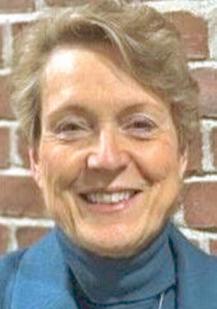
Pittsfield Cooperative Bank has hired Karen Sargent as the new assistant vice president/ branch manager at its Dalton location.
Sargent joins the Co-op with more than 15 years of experience in the financial services industry. Her expertise spans branch operations, customer relationship management, business banking, and team leadership at several regional institutions, including Adams Community, Berkshire, Citizens and NBT banks.
In her role as branch manager, Sargent will oversee daily operations, mentor staff and ensure the delivery of exceptional service to the bank’s valued customers.
A lifelong resident of Berkshire County, Sargent has been actively involved in various local organizations. Her commitment to strengthening local ties and supporting community initiatives aligns seamlessly with Co-op Bank’s dedication to serving the region.

UCP of Western Massachusetts has named Justine Buckley as its director of quality compliance.
Buckley will establish compliance procedures and develop organizational strategies to ensure that UCP continues to fulfill guidelines with all federal, state and local regulations. This is a new position at UCP that supports continued growth and expansion throughout the state.
Buckley’s 14-year career in human services spans a wide range of experience, from implementing positive behavior support systems to various supervisory roles. Previously, at The Arc of Opportunity in Fitchburg, she worked as the division director of day habilitation and family support. At Venture, she worked as a direct support professional, case manager, Positive Behavior Support coordinator, and behavior specialist.
This wide range of responsibilities has given Buckley an impressive skill set as a team player, clear communicator and effective leader. Her approach to quality and compliance is evidence-based and aims to achieve innovative solutions that result in positive outcomes.
Buckley received her bachelor of arts degree in psychology from UMass Amherst. She is a certified trainer of proactive approaches to behavioral challenges and a certified universal positive behavior support trainer.

